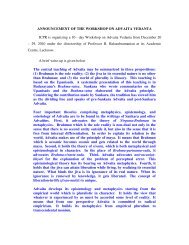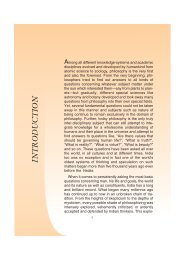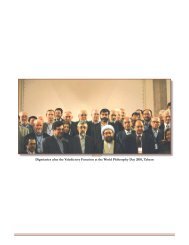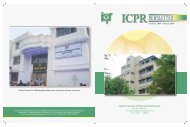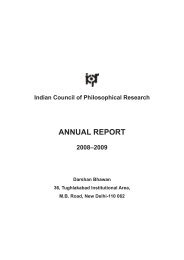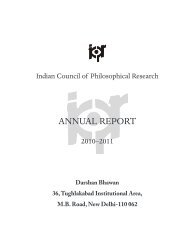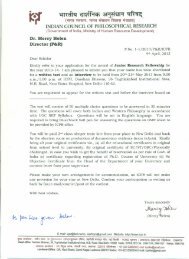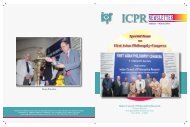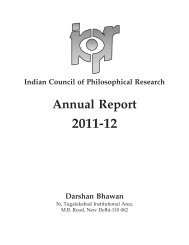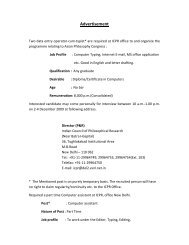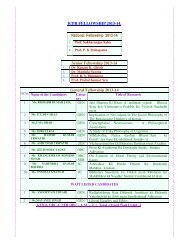ICPR NEWSLETTER final - Indian Council of Philosophical Research
ICPR NEWSLETTER final - Indian Council of Philosophical Research
ICPR NEWSLETTER final - Indian Council of Philosophical Research
- No tags were found...
Create successful ePaper yourself
Turn your PDF publications into a flip-book with our unique Google optimized e-Paper software.
<strong>ICPR</strong>NewsletterApril 2007 - March 2008<strong>ICPR</strong> CELEBRATESSilver Jubilee<strong>Indian</strong> <strong>Council</strong> <strong>of</strong> <strong>Philosophical</strong> <strong>Research</strong>Darshan Bhawan36 Tughlakabad Institutional AreaNew Delhi - 110062
From Member-Secretary's Deskndian <strong>Council</strong> <strong>of</strong> <strong>Philosophical</strong> <strong>Research</strong>(<strong>ICPR</strong>) has completed 25 years <strong>of</strong> itsImeaningful academic presence in the countryand all through the years, it has striven to create anacademically eventful history for philosophy andits allied disciplines in India. With the chiefobjective <strong>of</strong> promoting excellence, creativity andoriginality in philosophical research, <strong>ICPR</strong> hasmultiplied its activities and programs in all theseyears. It has taken a collective agenda <strong>of</strong> actionforward to purposively step into the future tosustain the nation's glorious philosophical traditionspanning over three millennia.The Silver Jubilee also signaled the new period <strong>of</strong>taking over the <strong>ICPR</strong> administration by Pr<strong>of</strong>essorK. Ramakrishna Rao, well known philosopher andpsychologist who joined as the Chairman <strong>of</strong> the<strong>ICPR</strong> in June 2006. With the visionary and activeleadership <strong>of</strong> our present Chairman, <strong>ICPR</strong> hopes togo from strength to strength and do its best to liveup to the purpose for which it was designed andstarted. In order to mark the completion <strong>of</strong> twentyfiveyears <strong>of</strong> service <strong>of</strong> <strong>ICPR</strong> in promotingphilosophical research in this country, a specialfunction was organized on March 26-27, 2007 at the<strong>Indian</strong> Medical Association Auditorium, NewDelhi. The Silver Jubilee event was also an occasionto honor the past Chairmen <strong>of</strong> the <strong>ICPR</strong> whoprovided the leadership and nourished the <strong>ICPR</strong>during the last twenty-five years. Pr<strong>of</strong>essor D.P.Chattopadhyaya, Pr<strong>of</strong>essor R. Balasubramanian,Pr<strong>of</strong>essor Mrinal Miri and Dr. Kireet Joshi wereable to attend the function where they werefelicitated by the Hon'ble Minister for HumanResource Development, Shri Arjun Singh. Also, tocommemorate the Silver Jubilee the <strong>ICPR</strong>instituted the <strong>ICPR</strong> Silver Jubilee Life-TimeAchievement Award to be given annually to a livingphilosopher in recognition <strong>of</strong> his/her distinguishedcontribution to philosophy. It carries an award <strong>of</strong>Rs.1,00,000/- in cash and a citation. The functionalso recognized the services <strong>of</strong> the <strong>ICPR</strong> staff whohave served the <strong>ICPR</strong> during the last twenty-fiveyears by presenting mementos to them.We are happy to revive the publication <strong>of</strong> theNewsletter which for some reason had ceased from theyear 2003. In reviving the Newsletter, it is our hopenot only to use it as our interface with the public butalso as a medium <strong>of</strong> communication among thephilosophical community in the country andabroad. This issue <strong>of</strong> the Newsletter covers the period<strong>of</strong> the <strong>Council</strong>'s activities from March 2007 toMarch 2008. With these words, I leave this Newsletterin the caring hands <strong>of</strong> all those who are interested inphilosophy in India in general and in <strong>Indian</strong>philosophy in particular.Godabarisha Mishra
<strong>ICPR</strong> is Nation's Think-tankHon'ble HRD Minister Shri Arjun Singh Ji addressing at the Silver Jubilee Celebrationam happy to be here this evening and joinyou in celebrating the Silver Jubilee <strong>of</strong> the<strong>Indian</strong> <strong>Council</strong> <strong>of</strong> <strong>Philosophical</strong> <strong>Research</strong>. IThe <strong>ICPR</strong> owes its existence to the initiative <strong>of</strong>Shrimati Indira Gandhi. Indiraji was a patron <strong>of</strong>learning and scholarship having grown up underthe guidance <strong>of</strong> Pandit Nehru, the greatestvisionary <strong>of</strong> Modern India.Philosophy has become today an underrated andesoteric discipline. There is a misconceivednotion that philosophy deals with theotherworldly matters and has nothing to <strong>of</strong>fer toour day-to-day mundane existence. Nothingcould be farther from truth. Not only does thisdiscipline provide the moorings to the existence<strong>of</strong> any society, it also results in the manifestation<strong>of</strong> its underpinnings. Unlike in the West,philosophy in India is known for its practicalityand life-applications, contrary to popularmisconceptions that it is other-worldly,renunciatory and pessimistic.In a conversation with Adlai Stevenson, PanditJawaharlal Nehru observed: “There is nodifficulty in choosing between the right andwrong if the question appears in that sense. It doesnot always appear clearly that way. Betweenwhite and black, there are many shades <strong>of</strong> gray.”The nation needs institutions that provide theintellectual climate that nurtures discriminatingwisdom for identifying the different shades <strong>of</strong>truth and error. It is considerations such as thesethat led to the creation <strong>of</strong> the <strong>Indian</strong> <strong>Council</strong> <strong>of</strong><strong>Philosophical</strong> <strong>Research</strong>, which could function asa think-tank <strong>of</strong> the nation. This also makes the<strong>ICPR</strong> a unique institution with no knownparallel in the world.Pr<strong>of</strong>essor Rao invited me a few months ago toinaugurate a discussion on a working paper heprepared for launching a major multidisciplinaryresearch project on National Identity andIntegration. Regrettably, I was unable toparticipate in it. However, I followed withinterest the deliberations <strong>of</strong> the Working Group,which included several distinguished persons.The notion <strong>of</strong> the nation state stands threatenedin the face <strong>of</strong> manifest multicultural settings inmany countries. In our country itself, people facethe threat <strong>of</strong> being divided by caste, religion,region and language, all clouding the nationalidentity. How may we secure the beautiful1
mosaic <strong>of</strong> multiculturalism and at the same timepreserve the distinctive identities <strong>of</strong> our peoplethat would add to the grandeur and greatness <strong>of</strong>the nation? I quote Panditji again: “Thoughoutwardly there was diversity and infinite varietyamong our people, everywhere there was thattremendous impress <strong>of</strong> oneness, which had heldall <strong>of</strong> us together for ages past, whatever politicalfate <strong>of</strong> misfortune had befallen us.”India retained its spiritual and cultural unity overmillennia despite its being a multicultural societybecause <strong>of</strong> its common core spirituality and thebinding values <strong>of</strong> love, altruism, truth and nonviolence.It is imperative that these values beespoused and put into action at the national levelas well. What we need is the inclusive communitywith distinctive <strong>Indian</strong> identity and the necessaryvalues to foster and promote them.Today, the country is on an accelerated economicgrowth path. This growth must necessarily beinclusive, encompassing the entire spectrum <strong>of</strong>our society with no exclusions. The need forinclusiveness mandates us to provide the entirecitizenry with equity <strong>of</strong> access to opportunitiesthat would become available with growth anddevelopment.I understand that the <strong>ICPR</strong> has prepared aproposal for establishing the <strong>Indian</strong> Institute <strong>of</strong>Philosophy with a virtual campus and floatingfaculty. It is an innovative concept in highereducation, an interesting blend betweentraditional campus-bound universities and thedistance mode <strong>of</strong> learning. I also note that youhave plans for establishing regional centers toencourage and strengthen philosophy regionwise.We all know that there is a wealth <strong>of</strong>philosophical wisdom in our regional languagesthat needs to be identified, evaluated, translatedand distributed across the country and beyond.I am delighted that the <strong>ICPR</strong> instituted an awardto commemorate its Silver Jubilee year torecognize distinguished lifetime achievements <strong>of</strong><strong>Indian</strong> philosophers. I congratulate Pr<strong>of</strong>essorSatchidananda Murty, distinguished scholar,teacher and an outstanding philosopher in postindependentIndia for being the first to receivethe well-deserved award.Pandit Jawaharlal Nehru said in a speech inChandigarh on 27th February 1959: “Let sciencegrow, as it must and will. Let the arts andhumanities grow also. Behind it all let there bethat dynamism, that vibrant message, thatcreativeness without which life for the individualbecomes drab and dull.” In bringing the <strong>ICPR</strong>into existence twenty-five years ago, Indirajitranslated the vision <strong>of</strong> Panditji into reality.I have followed with interest the work at the<strong>ICPR</strong> over the years. I congratulate the scholarsand the staff <strong>of</strong> the <strong>ICPR</strong> for the good work done.Let us not rest on past laurels but move forwardwith vigor, vibrancy, dynamism, and creativityto justify the goal <strong>of</strong> becoming India's think-tankand the nation's wisdom source.Chairman delivering his speech duringSilver Jubilee FunctionChairman felicitating HRD Minister duringSilver Jubilee Function2
Chairman's Vision <strong>of</strong> the <strong>ICPR</strong>Pr<strong>of</strong>essor K. Ramakrishna Rao, Chairman <strong>ICPR</strong>, addressing at the Silver Jubilee Celebrationon'ble Union Minister for HumanResource Development, Shri ArjunHSingh ji, Past Chairmen <strong>of</strong> the <strong>ICPR</strong>Pr<strong>of</strong>essor D.P. Chattopadhyaya, Pr<strong>of</strong>essorR.Balasubramanian, Pr<strong>of</strong>essor Mrinal Miri and Dr.Kireet Joshi, Members <strong>of</strong> the <strong>ICPR</strong> <strong>Council</strong>,Governing Body and the <strong>Research</strong> ProjectCommittee, Fellows <strong>of</strong> the <strong>ICPR</strong>, DistinguishedInvitees, Members <strong>of</strong> Media, Ladies andGentlemen.As the Chairman <strong>of</strong> the <strong>Indian</strong> <strong>Council</strong> <strong>of</strong><strong>Philosophical</strong> <strong>Research</strong>, it is my pleasant privilegeto welcome all <strong>of</strong> you to this very special functionto celebrate the completion <strong>of</strong> 25 years <strong>of</strong> service bythe <strong>ICPR</strong> to the nation in general and itsphilosophical community in particular. I am toldthat the <strong>ICPR</strong> was conceived and incorporated asearly as in March 1977; but it was just an unbornidea growing in the womb <strong>of</strong> the Government <strong>of</strong>India for a number <strong>of</strong> years. Its actual birth tookplace in 1981, thanks to the foresight and wisdom <strong>of</strong>that great patron <strong>of</strong> learning Smt. Indira Gandhi. Iwas privileged to have discussed many things fromparapsychology to politics with Indiraji, butinterestingly <strong>ICPR</strong> was not one <strong>of</strong> them.If we humans have nine months <strong>of</strong> pre-natalexistence and then are expected to live to behundred, the <strong>ICPR</strong>, with more than four years <strong>of</strong>pre-birth developmental history, can be easilyexpected to live for full five centuries. Therefore,25 years in its life may be considered to be no morethan early childhood.Since its inception, the <strong>ICPR</strong> has strived to serve thephilosophical community in the country with thesublime goal <strong>of</strong> promoting philosophicalexcellence. As I see it, the <strong>ICPR</strong> is not and will notbe the personal estate <strong>of</strong> one or more persons orgroups but a consummate trust <strong>of</strong> the entirephilosophical community in the country. Over theyears <strong>ICPR</strong> endeavored to promote study andresearch in philosophy by (a) providing financialassistance to a large number <strong>of</strong> students and scholarsto carry out philosophical research, (b) aiding in theconduct <strong>of</strong> national, regional and internationalconferences, seminars and workshops to discussand exchange philosophical thoughts and (c)publishing over 100 scholarly books.We had so far five accomplished Chairmen whotook care <strong>of</strong> the <strong>ICPR</strong> in its infancy. Soon after itsbirth, Pr<strong>of</strong>essor D.P.Chattopadhyaya was chosenby Smt. Indira Gandhi to care for the <strong>ICPR</strong> as itsChairman and Dr. Kireet Joshi joined him as theMember-Secretary. Together they nurtured the<strong>ICPR</strong> for the next ten years. Keeping their longassociation with the growing institution inperspective, if they were occasionally seen as3
eing over-indulgent, I think, it is entirely understandable.I asked Pr<strong>of</strong>essor Chattopadhyaya about (a) whathe considers to be the important special things that<strong>ICPR</strong> accomplished, apart from its routineactivities, during his tenure as the Chairman and (b)what in his view are the challenges ahead. Herecalled two things as standing out prominently inhis mind. First is the launching <strong>of</strong> the Project <strong>of</strong>History <strong>of</strong> <strong>Indian</strong> Science, Philosophy and Cultureunder his editorship. The Project envisages thepublication <strong>of</strong> 100 volumes. The majority <strong>of</strong> themare already published or on their way to be out.The Project has since moved out <strong>of</strong> the <strong>ICPR</strong> and isnow administered by the Centre for Studies inCivilization headed by Pr<strong>of</strong>essor Chattopadhyayahimself. The second is the publication <strong>of</strong> theJournal <strong>of</strong> <strong>ICPR</strong>, with him as the Founding Editor.The <strong>ICPR</strong> continues to publish the Journal withPr<strong>of</strong>essor Daya Krishna as the editor. Pr<strong>of</strong>essorChattopadhyaya considers that the biggestchallenge before the <strong>ICPR</strong> is to encourageinterdisciplinary research relevant to theintellectual needs <strong>of</strong> the country, a suggestion withwhich I completely concur.I asked the other Chairmen who are around thesame questions. Pr<strong>of</strong>essor R. Balasubramanianrecalls a series <strong>of</strong> important publications that the<strong>ICPR</strong> was able to bring out during his time. Theseinclude (i) four volumes on Nyaya philosophy, (ii)four volumes comprising <strong>of</strong> presidential addressesgiven at the annual meetings <strong>of</strong> the <strong>Indian</strong><strong>Philosophical</strong> Congress, and (3) nine volumes in the“Builders <strong>of</strong> <strong>Indian</strong> Philosophy” series. He alsorecalls numerous “Meet the Philosopher” nationalseminars that honoured a number <strong>of</strong> philosophersand provided an opportunity to young scholars tointeract with them. Pr<strong>of</strong>essor Balasubramanianwould like the <strong>ICPR</strong> to concentrate on promotingand publishing research in <strong>Indian</strong> philosophy.Pr<strong>of</strong>essor Mrinal Miri was the Chairman during1994-1997. During Pr<strong>of</strong>essor Miri's time a largenumber publications were brought out by the<strong>Council</strong>. Pr<strong>of</strong>essor Miri thinks that <strong>ICPR</strong> shouldfocus on promoting philosophical research withoutdiluting its resources in areas that are not intrinsicto it. Pr<strong>of</strong>essor V. Venkatachalam who is no moreserved during 1997-2000.Dr. Kireet Joshi has a long list <strong>of</strong> activities duringhis tenure beginning with the new millennium.Among the new initiatives taken during this periodare (1) Project on Consciousness and (b) Project <strong>of</strong>Philosophy <strong>of</strong> “Value-Oriented Education”. Healso recalls the valuable essay competitions andyoung scholars' seminars and the celebration <strong>of</strong>International Philosophy Day in many universitiesin the country with financial assistance <strong>of</strong> the<strong>ICPR</strong>. Pr<strong>of</strong>essor Joshi's vision <strong>of</strong> <strong>ICPR</strong> is to see itdevelop “as an extremely important instrument forthe growth <strong>of</strong> the <strong>Indian</strong> renaissance”. He wouldlike to see interdisciplinary research encouragedbecause “the very essential nature <strong>of</strong> philosophy isinter-disciplinary”. I entirely agree with this view.Having heard all the good things my predecessorshave done, you might be rightly wondering what Iam planning to do and hope to achieve in the yearsahead.First and foremost, I would like to assure theprevious Chairmen <strong>of</strong> the <strong>ICPR</strong> that we wouldcontinue all the good things they have initiated andare found to work well. But then we also have fewother plans to build <strong>ICPR</strong> further and helptransform it to function truly as the nation's thinktank, an intellectual resource centre <strong>of</strong> the country.We are counting on the help and support <strong>of</strong>our Hon'ble Minister Shri Arjun Singh ji who isrelentlessly striving to not only promote excellencein higher education, but also make it accessible to allsections <strong>of</strong> our society, excluding none, byproviding special inputs for the socially andeconomically disadvantaged groups and minoritycommunities. He recognizes, I am glad to note,there should be (a) not only equality <strong>of</strong> access tohigher education to all <strong>Indian</strong>s, but also, moreimportantly, (b) all those who enter our centres <strong>of</strong>higher learning should come out as equals in whatthey have learned and what they may be expected toaccomplish on graduation. When they enter, allstudents may not be equal in prior preparation; but,when they leave, all sections <strong>of</strong> students, whetherSCs, STs or OBCs or others belonging to4
disadvantaged minorities should come out asequals, well prepared to serve the nation. In otherwords, remedial education is equally important tomake the policy <strong>of</strong> reservations work well.The first on our agenda <strong>of</strong> action is the establishment<strong>of</strong> the <strong>Indian</strong> Institute <strong>of</strong> Philosophy. Unlikethe IITs and IIMs the IIP would have a virtualcampus and floating faculty. It would be a new andunique experiment in higher education incorporatingthe best in traditional campus learning andthe distance mode. What do I mean by virtualcampus and floating faculty?The virtual campus, unlike the traditional campusbasedinstitutions, would not have permanentclassrooms built in concrete and constantlyconfined to one place. Rather it involves continuouslychanging networks using the state <strong>of</strong> the artIT infrastructure and communication facilitiescreatively connecting faculty and students in closeintellectual bonds. The projected IIP with itsfloating faculty would not have permanent teachingstaff but pr<strong>of</strong>essors temporarily hired and in somecases on a part time basis to serve specific functions<strong>of</strong> monitoring and mentoring a select batch <strong>of</strong>brilliant students, ushering in a new generation <strong>of</strong>philosophers.Second, we propose to establish regional centres <strong>of</strong><strong>ICPR</strong>. These may be specially created or the <strong>ICPR</strong>may adopt some existing establishments and putsubstantial inputs into them. The purpose <strong>of</strong> theseregional centres is not merely to expand theactivities <strong>of</strong> the <strong>ICPR</strong> region-wise, but, moreimportantly, to exploit the regional philosophicalwealth and wisdom to promote philosophicalexcellence. We all know that each language has itsown treasure <strong>of</strong> philosophical works. These needto be identified translated, and brought to theattention <strong>of</strong> scholars around the world.Third, as part <strong>of</strong> our endeavor to act as nation'sthink tank and intellectual resource, the <strong>ICPR</strong> hasproposed a mega interdisciplinary project entitled“National Initiative for Integration and InclusiveCommunity”. A working group consisting <strong>of</strong>some high pr<strong>of</strong>ile academics, bureaucrats and NGOleaders discussed a working paper and prepared afive year plan <strong>of</strong> research which is now under theactive consideration <strong>of</strong> the Planning Commissionfor funding.This project is warmly greeted by several scholars,researchers and policy makers with whom Ihappened to discuss it. Most seem to share theanxiety that the country is going through anidentity crisis. The oneness and unity that boundpeople together during the freedom struggle, whichJawaharlal Nehru notes in his Discovery <strong>of</strong> India,appear to be missing now. What is it to be an<strong>Indian</strong>? In what does our <strong>Indian</strong>ness consist? Whatis our national identity? How can we have aninclusive community and promote common good,overcoming the age old constraints that excludeseveral sections <strong>of</strong> population from participating inand sharing the benefits <strong>of</strong> political freedom andeconomic development?It is increasingly felt that the <strong>Indian</strong> society isgetting divided fragmented and polarized withgrowing alienation between groups and thatregional, caste, religious and other narrow identitiesare gaining salience over national identity. If thistendency is allowed to continue, it is feared, therewould be not only role confusion at various levelsbut grave and dangerous social unrest anddysfunction, threatening the very foundation <strong>of</strong>our democracy. The proposed project envisages indepthinterdisciplinary research on various aspects<strong>of</strong> the problem <strong>of</strong> national identity with the goal <strong>of</strong>identifying problems and suggesting solutions forbringing about an inclusive community andpromoting common good we all seek.Fourth, we at the <strong>ICPR</strong> recognize not only theimportance <strong>of</strong> interdisciplinary research but alsothe need for inter-institutional synergy. Therefore,we are actively pursuing to undertake collaborativeand cooperative activities with sister institutions.For example, <strong>ICPR</strong> is working with the <strong>Indian</strong>Institute <strong>of</strong> Advanced Study to organize in July thisyear a national seminar on the “Dialectics <strong>of</strong>Identity and Alienation.” We have similarproposals for organising national seminars on thefollowing topics: “Class Struggle and CommonGood: The Evolution <strong>of</strong> Communism from Marxto Mao and Beyond”, “<strong>Indian</strong> Psychology: Theories5
and Models, Classical Philosophies <strong>of</strong> Mind andCognitive Science and Celestial Love : Bhakti in<strong>Indian</strong> Traditions”.As may be noted, all the above are in many waysinter-related activities that are intended to focuson the relevance <strong>of</strong> applied philosophyand interdisciplinary research for nationaldevelopment.The <strong>ICPR</strong> will continue to vigorously promotephilosophical excellence in the country. A part <strong>of</strong>this process is to recognize excellence. Towardsthis end, we have instituted an Award to beannually given to a living <strong>Indian</strong> philosopherrecognizing his/her life time contributions tophilosophy. I am delighted that you, the Hon'bleMinister Sir, will be presenting the first such awardtoday.Time does not permit me to speak on several otheritems in <strong>ICPR</strong>'s agenda <strong>of</strong> action. I recognize thatwe can achieve what we hope for, only with yourcontinued interest, guidance and help. Withoutthem, many <strong>of</strong> our earnest proposals would simplyremain sweet dreams without substance; and the<strong>ICPR</strong> would continue to serve marginally,distributing small sums <strong>of</strong> money to support thisscholar and that fellow, this conference and thatseminar. That would be far from accomplishingthe high objectives and l<strong>of</strong>ty goals associated withthe establishment <strong>of</strong> the <strong>ICPR</strong>. However, I amconfident and I have every reason to think that wecan count on the Hon'ble Minister's blessings andguiding support to see these projects through.Also, I want to acknowledge on this occasion, thecooperation and support we received from the<strong>of</strong>ficials <strong>of</strong> the Department <strong>of</strong> Human ResourceDevelopment from the Secretary to the SectionOfficer.The <strong>ICPR</strong> is fortunate to have a very learned,cooperative and competent group <strong>of</strong> scholars as themembers <strong>of</strong> its <strong>Council</strong>, Governing Body and<strong>Research</strong> Project Committee. I have receivedcontinuous support from all the members. In factmy confidence in attempting to move fast on somany fronts all too soon after taking charge as theChairman is built largely on the perception <strong>of</strong> thevalue and strength <strong>of</strong> their cooperative guidanceand supportive participation in the activities <strong>of</strong> the<strong>ICPR</strong>.We are also fortunate to have hard working andcommitted staff who are sparing no efforts to sharemy dreams and move the <strong>ICPR</strong> forward inpromoting philosophical excellence in the country.I wish to record my appreciation and thanks on thisoccasion to all our hard working staff and mycolleagues in the <strong>Council</strong>, Governing Body and the<strong>Research</strong> Project Committee.Permit me, Hon'ble Shri Arjun Singh Ji, to thankyou for the confidence you have bestowed on me byentrusting me with the responsibility to lead the<strong>ICPR</strong>. I will do my very best to live up to yourexpectations.HRD Minister lighting the lampPr<strong>of</strong>essor Y.V. Satyanarayana receiving the Silver JubileeAward on behalf <strong>of</strong> Pr<strong>of</strong>essor K. Satchidananda Murty6
New Additions to <strong>ICPR</strong>'s Human ResourcePr<strong>of</strong>essor G. Mishra joins as the Member-SecretaryPr<strong>of</strong>essor Godabarisha Mishra from University <strong>of</strong>Madras, Chennai joined as Member Secretary <strong>of</strong> the<strong>Council</strong> on 7th September 2007. Pr<strong>of</strong>essor Mishrareceived his Ph.D. from the University <strong>of</strong> Madras in1986 and his doctoral thesis was on “Philosophy <strong>of</strong>Upanishads : An Analytical Exposition”. Earlier,he served as an Editor <strong>of</strong> the Journal <strong>of</strong> Oriental<strong>Research</strong> at Kuppuswami Shastri <strong>Research</strong>Institute, Chennai. He has been a visiting faculty <strong>of</strong>Oxford University, UK and Mahatma GandhiInstitute, Mauritius. He has written four booksand several articles on various aspects <strong>of</strong>philosophy in national and international journalsand attended many seminars and conferences inIndia and abroad.Dr. S.K. Yadav and Dr. B. Barik join <strong>ICPR</strong> FamilyDr. S.K. Yadav joined <strong>ICPR</strong> as Director(Administration and Finance) on 23rd January2008. Before joining <strong>ICPR</strong>, Dr. Yadav served asAssistant Commissioner <strong>of</strong> Muncipal Corporation<strong>of</strong> Delhi. He also worked in NPC, New Delhi,JNU, DTC and the <strong>Indian</strong> Air Force in diffrentcapacities. Besides Ph.D. in Hindi, he possessesMaster Degrees in Personal Management andIndustrial Relation and in Sanskrit.Dr. Bansidhar Barik joined as Programme Officer<strong>of</strong> <strong>ICPR</strong> on 1st January 2008. He got his Ph.D. fromJawaharlal Nehru Unversity, New Delhi on "AnExamination concerning dualism in Rene Descartesand Deconstruction <strong>of</strong> Jacque Derrida". Beforejoining <strong>ICPR</strong>, Dr. Barik worked as a Lecturer atDIT, Dehradun for three years and worked as aSenior Fellow in different organisations and alsowas a General Fellow <strong>of</strong> <strong>ICPR</strong>. He has authored abook titled, Rationalism and Post-Modernism.7
The <strong>ICPR</strong> proposed a Major <strong>Research</strong> Project onNational Integration funded by the PlanningCommission during the 11th Plan period. TheProject is meant to be a national initiative toexplore the nuances <strong>of</strong> national integration andinclusive community and to understand the forcesundermining them. The main objective <strong>of</strong> theproject is to provide intellectual and fact basedinsights into the issues, the problems as well as theprospects, for promoting national consensus for theinclusive community.The <strong>Council</strong> began the main activity <strong>of</strong> this projectby being a nodal agency and initiated groupdiscussions <strong>of</strong> experts in relevant and related areasand organized two workshops. A group consisting<strong>of</strong> high pr<strong>of</strong>ile academicians, bureaucrats and NGOleaders met at the Darshan Bhawan and discussed atlength for a major research project for promotingintegration and inclusiveness in the <strong>Indian</strong> Societyand for preventing growing cleavages and avoidablepolarizations precipitated by narrow identitiesexploited by politics <strong>of</strong> divisiveness.National Workshop on NationalIntegrationAs a follow up <strong>of</strong> the fruitful discussions at the firstworkshop, the <strong>Council</strong> had organized a NationalWorkshop on the "Dialectics <strong>of</strong> the Inclusivenessand Exclusion: Exploring the Elements <strong>of</strong>In addition to the regular seminars proposed byscholars and supported by <strong>ICPR</strong>, the <strong>Council</strong> wasproactively involved itself in conducting threenational level seminars on its own.<strong>ICPR</strong> ActivitiesNational Integration and <strong>Indian</strong> IdentitySeminars organized by the <strong>Council</strong>Exclusiveness and Ingredients <strong>of</strong> Inclusiveness andIntegration in <strong>Indian</strong> Society". The workshop wasorganized in collaboration with <strong>Indian</strong> Institute <strong>of</strong>Advanced Study, Shimla from 14-16 September2007 which yielded fruitful results. The outcome<strong>of</strong> the deliberations will be published by the<strong>Council</strong> shortly so that the ideas could reach awider audience and stimulate nationwidediscussion. Intense discussions took place on issueslike (a) what it is to be an <strong>Indian</strong>? (b) in what doesthe <strong>Indian</strong> identity consist? (c) how do we promotenational integration and discourage the politics <strong>of</strong>divisiveness fed on narrow identities <strong>of</strong> caste,religion, region, language and other subordinateidentities?Shri Sitaram Yechuri, Hon'ble Member <strong>of</strong>Parliament inaugurated the Seminar and Pr<strong>of</strong>essorBhalchandra Mungekar presided over theInaugural Session. The distinguished participantsincluded Shri B.N. Yugandhar, Shri K.Padmanabhan, Pr<strong>of</strong>essor Rajendra Prasad,Pr<strong>of</strong>essor K.S. Chalam, Dr. Sudhir Kakar, ShriAbid Hussain, Smt. Trilok Karki Hussain,Pr<strong>of</strong>essor Ashok Vohra and Pr<strong>of</strong>essor C.V.Raghavulu. Pr<strong>of</strong>essor K. Ramakrishna Raointroduced the theme <strong>of</strong> the seminar in theInaugural Session and Pr<strong>of</strong>essor G. Mishraproposed the Vote <strong>of</strong> Thanks.Seminar on BhaktiA National Seminar on “Celestial Love: Bhakti inthe <strong>Indian</strong> Tradition” was organized by the <strong>ICPR</strong> incollaboration with Tirumala Tirupati Devasthanams(TTD) at Tirupati, Andhra Pradesh fromDecember 5-7, 2007. There were 300 scholars fromacross the length and breadth <strong>of</strong> this country, with aInauguration <strong>of</strong> the Bhakti Seminar at Tirupati8
few from abroad who gathered in Tirupati todiscuss different aspects <strong>of</strong> Bhakti. Papers on themeslike philosophical foundations <strong>of</strong> Bhakti,ramifications <strong>of</strong> Bhakti to the individual and society,understanding the various Bhakti movements fromdifferent regions, Bhakti as a purushartha werepresented and discussed. Also a special session onAnnamacharya (this year being the SixthCentenary year <strong>of</strong> Annamacharya) was organizedas a part <strong>of</strong> the session.Pr<strong>of</strong>essor Nirbhai Singh speaking at the Seminar on BhaktiPr<strong>of</strong>essor K. Ramakrishna Rao gave the Inauguraladdress. Pr<strong>of</strong>essor G. Mishra welcomed the augustgathering. Pr<strong>of</strong>essor Anand Paranjape <strong>of</strong> SimonFraser University, Canada gave the keynoteaddress. Other distinguished participants includedDr. Srivatsa Goswami, Pr<strong>of</strong>essor H.K. Satapathi,Pr<strong>of</strong>essor K. Prahlada Char, Pr<strong>of</strong>essor V. KutumbaSastri, Pr<strong>of</strong>essor K. S. Radhakrishnan, Pr<strong>of</strong>essorHrudananda Roy, Pr<strong>of</strong>essor S.M.S. Chari, andPr<strong>of</strong>essor C. Ramaiah. The Valedictory Session waspresided over by Shri Bhuman Karunakara Reddy,Chairman, TTD and Shri K.V. Ramanachari,Executive Officer, TTD delivered the Valedictoryaddress. Pr<strong>of</strong>essor G. Vedaparayana was the localcoordinator <strong>of</strong> this seminar.Seminar on <strong>Indian</strong> PsychologyAnother National Seminar on “<strong>Indian</strong> Psychology:Theories and Models” was organized by the <strong>ICPR</strong>in collaboration with SVYASA Yoga University inBangalore from December 26-28, 2007. Nearly 300participants who were there during this eventdiscussed the relevance <strong>of</strong> classical <strong>Indian</strong>philosophy to current psychological theory,practice and research. The moral <strong>of</strong> this exercise isthat <strong>Indian</strong> scientists may not simply labor in the“catch up” game and merely replicate and imitateWestern studies but engage in innovative newavenues <strong>of</strong> research leading to original contributionsstimulated by <strong>Indian</strong> theories and models.Pr<strong>of</strong>essor Anand Paranjape, Pr<strong>of</strong>essor JanakPandey, Dr. Sudhir Kakar, Pr<strong>of</strong>essor Nagendra, Dr.Nagaratna, Pr<strong>of</strong>essor Kiran Kumar, Dr. MathiasCornellisen were a few <strong>of</strong> the large number <strong>of</strong>participants at the seminar.Seminar on <strong>Indian</strong> Philosophies <strong>of</strong> MindA major <strong>ICPR</strong> interdisciplinary seminar under thedirectorship <strong>of</strong> Pr<strong>of</strong>essor Janak Pandey on “<strong>Indian</strong>Philosophies <strong>of</strong> Mind and Cognitive Science” washeld at Allahabad University from February 29 toMarch 2, 2008. The seminar was jointly organizedby <strong>ICPR</strong> and the Centre <strong>of</strong> Behavioral andCognitive Science <strong>of</strong> Allahabad University. Theobjective <strong>of</strong> organizing this major interdisciplinaryseminar was to focus on the relevance <strong>of</strong> classical<strong>Indian</strong> thought to current science as there has been agrowing interest among philosophers and cognitivescientists to use the wealth <strong>of</strong> indigenousphilosophical traditions to study mind andconsciousness. The deliberations at the seminarwere an enriching experience initiating animportant dialogue between cognitive scientistsand philosophers in the country. It was also ameaningful exposure for the philosophers to knowmore about new dimensions <strong>of</strong> scientificinvestigations that have important philosophicalimplications. The seminars attempted to bridge thePr<strong>of</strong>essor P.K. Mukhopadhyaya, Pr<strong>of</strong>essorK. Ramakrishna Rao and Pr<strong>of</strong>essor G. Mishra on dais9
gap between the <strong>Indian</strong> philosophies <strong>of</strong> mind andthe contemporary cognitive science. The InauguralSession <strong>of</strong> the seminar was presided over byPr<strong>of</strong>essor P.K. Mukhopadhyaya. Pr<strong>of</strong>essor K.Ramakrishna Rao, Chief Guest <strong>of</strong> the Seminarpresented a thematic paper on Cognitive Scienceand Classical <strong>Indian</strong> Philosophies <strong>of</strong> Mind. Thepaper focused on the <strong>Indian</strong> philosophicalapproaches to cognitive science. The ValedictorySession <strong>of</strong> the seminar was chaired by Pr<strong>of</strong>essorNirupa Rani, Vice-Chancellor, Adi Kavi NannayaUniversity, The Chief Guest Pr<strong>of</strong>essor R.G.Harshe, Vice-Chancellor, University <strong>of</strong> Allahabadextensively quoted Pr<strong>of</strong>essor Rao's paper andhighly appreciated this initiative <strong>of</strong> workingtogether by the <strong>ICPR</strong> and the CBCS, AU. Thisseminar facilitated exchange <strong>of</strong> ideas betweencognitive scientists and <strong>Indian</strong> philosophers.However, there was an all over consensus that thisinteraction and dialogue should be carried outthrough collaborative projects. Pr<strong>of</strong>essorRamakrishna Rao proposed and invited scholars towork together to come up with proposals. Heapprised the scholars that the Department <strong>of</strong>Science and Technology, Government <strong>of</strong> India hascurrently recognized cognitive science as the fourthpillar <strong>of</strong> knowledge and has a new "cognitivescience initiative" to fund research. He furtheradvised the scholars to take advantage <strong>of</strong> thisopportunity which is also very supportive for<strong>Indian</strong> approaches to cognitive science.Three major publications will emerge out <strong>of</strong> theproceedings <strong>of</strong> these seminars.Pr<strong>of</strong>essor Daya Krishna RememberedPresentation <strong>of</strong> bouquet toVice-Chancellor Dr. N.K. JainThe <strong>Council</strong> organized a National Seminar inmemory <strong>of</strong> late Pr<strong>of</strong>essor Daya Krishna for hisinvaluable contribution to philosophy in India ingeneral and <strong>Indian</strong> philosophy in particular. It washeld at Rajasthan University, Jaipur under thedirectorship <strong>of</strong> Pr<strong>of</strong>essor Mrinal Miri duringMarch 25-27, 2008. The title <strong>of</strong> the Seminar was“Daya Krishna: A Life Work in Philosophy”. TheSeminar was aimed at addressing Daya Krishna'scontribution to an authentic and constructivelycritical understanding <strong>of</strong> classical <strong>Indian</strong> philosophicalthought, by taking a comprehensive view<strong>of</strong> Dayaji's criticism <strong>of</strong> arguments, theories andPr<strong>of</strong>essor G. Mishra addressing the participantsview points in the history <strong>of</strong> <strong>Indian</strong> thoughtscattered in the substantial body <strong>of</strong> his writings.Pr<strong>of</strong>essor R. Balasubramanian, ex-Chairman, <strong>ICPR</strong>presented the Inaugural Address and recalled hisassociation with late Pr<strong>of</strong>essor Daya Krishna.Pr<strong>of</strong>essor Mrinal Miri welcomed the gathering andPr<strong>of</strong>essor G. Mishra proposed a vote <strong>of</strong> thanks.Scholarly papers were presented by Pr<strong>of</strong>essorSrinivasa Rao, Pr<strong>of</strong>essor G. Mishra, Pr<strong>of</strong>essorSujata Miri, Pr<strong>of</strong>essor Raghuram Raju, Dr. ShailMayaram, Pr<strong>of</strong>essor R.S. Bhatnagar, Pr<strong>of</strong>essorYashdev Shalya and many others who participatedin the seminar.10
Life-time Achievement AwardsPr<strong>of</strong>essor K. Satchidananda MurtyThe <strong>Research</strong> Project Committee <strong>of</strong> the <strong>Council</strong>voiced the need to institute a National Award fordistinguished work in Philosophy in India, namely,“<strong>ICPR</strong> Silver Jubilee Award for Distinguished LifeTime Achievement in Philosophy” to be awardedto a living <strong>Indian</strong> Philosopher and which does notrequire any project to be carried out by therecipient <strong>of</strong> that award. Considering that the yearwas the Silver Jubilee Year <strong>of</strong> the <strong>ICPR</strong>, the awardwas called the <strong>ICPR</strong> Silver Jubilee Award. Theaward amounts to Rs 1.00 lakh cash. The first suchaward was conferred upon Pr<strong>of</strong>essor K.Satchidananda Murty.Pr<strong>of</strong>essor Daya KrishnaShri Arjun Singh, Honorable Minister for HRDwas gracious enough to participate in the meetingand present the award.The Life Time Award for this year (2007-2008) wasawarded to Pr<strong>of</strong>essor Daya Krishna by aCommittee which resolved unanimously torecommend him for the award <strong>of</strong> Rs1.00 lakh. SincePr<strong>of</strong>essor Daya Krishna was no more, the cashaward was decided to be given to an Institution inIndia preferably Rajasthan University which iswilling to provide a matching grant to institute afellowship to be awarded to a philosophy studentannually.<strong>ICPR</strong> FellowshipsNational FellowshipsThe <strong>Council</strong> awarded National fellowships to twoeminent scholars, Pr<strong>of</strong>essor R. Balasubramanian,our former Chairman <strong>of</strong> the <strong>ICPR</strong> and Pr<strong>of</strong>essorP.K. Mukhopadhyaya, retired Pr<strong>of</strong>essor fromJadavpur University to work on their projectsentitled “The Vedantic inquiry after Ramarayakavi” and“Philosophy and Human Progress” respectively.Pr<strong>of</strong>essor R. BalasubramanianPr<strong>of</strong>essor P.K. Mukhopadhyaya11
Other FellowshipsSenior FellowshipsSenior Fellowships were awarded to Pr<strong>of</strong>essorsBijayananda Kar and Pr<strong>of</strong>essor Ganesh Prasad Dasfor working on their projects entitled “LokayataDarsana: A Reconstruction and Appraisal” and“Wittgenstein and Samkara on Religion and ethics:A Critico-constructive Study” respectively.Fifteen General Fellows and, forty six Junior<strong>Research</strong> Fellows were awarded for the year 2007-2008 to work on different projects as given below.General FellowshipsThe <strong>ICPR</strong> awarded General Fellowships during theyear 2007-2008 to the following Fellows:Dr. Moyeed Ul ZafarReason and Rationality in Hadith Literature: A critical studyDr. Pius V.T.Critical Hermeneutics and the Purview <strong>of</strong> a possible interculturalcommunicationDr. Deepak KumarBharatiya chintan mein manav ki niyati: Ek SanskritikadhyayanDr. Manoj Kumar SinghTantrik bhasha ka sameekshanatmak adhyayanDr. Autar Lal MeenaThe Doctrine <strong>of</strong> Social Justice in <strong>Indian</strong> PhilosophyDr. Sharad Kumar Mishra,Analytical Study <strong>of</strong> concepts <strong>of</strong> Atmatattva in <strong>Indian</strong>Philosophy: In special context <strong>of</strong> AtmatattvavivekDr. Seema Bagdwal,Samakaleen paridrishya mein Vivekananda ke darshan kiprasangikataDr. Sanjay Kumar TiwariKhandana Khanda Khadya ke parampaksha ka anthashtriyavishleshanDr. Manoj Kumar TiwariManushya Ke Swaroop Evam Uski Niyati: Yogvasisth Kevisisth sandharb mein ek anushilanDr. MadhviBhagwat vedanta sutra evam gita bhashaon ke tulnaDr. Lal Babu Prasad YadavMahatma Gandhi aur Ravindranath Tagore ke samajikRajnaitik aur dharmik vicharaon ka tulnatmak adhyayanMr. Chennamsetty Yagna SudhakarThe nature <strong>of</strong> consciousness Buddhist: Alaya-vijnana andphenomenologyDr. Vinita PandeyBrihadaranyak Upanishad mein pratipadit darshanik vicharaur bauddh math: Ek tulanantmak adhyayanDr. Charu AwasthiChetnaka Upanishadiya swaroop evam adhunik gyan: Eksameekshatmak adhyayanMr. A. ArivazhaganDoctrine <strong>of</strong> Pancakosa on the problem <strong>of</strong> enworlded subjectivity:Advaitic and continental philosophical perspectivesJunior <strong>Research</strong> FellowshipsThe following scholars were awarded Junior<strong>Research</strong> Fellowships for the year 2007 - 2008Ms Saba ParveenA critical study with special reference to Michael Foucault andJacques DerridaMs Arati ModakAdhunik Sabhyata ka sankat evam manav ki bhumika- ekdarshanik vivechanaMr. Chakrapani TripathiA critical study <strong>of</strong> Kantian epistemologySmt Kavita BhattGherand sanhita ka darshanik adhyayan: Shatkarma kevishesh sandarbh meMs Chandra Rekha SoniKierkegaard's and J. P. Sartre's vision <strong>of</strong> man: A philosophicalStudyMs Lighitha PEnhancing the boundaries <strong>of</strong> knowledge: Towards a syntheticmodel <strong>of</strong> explanation and understanding types <strong>of</strong>knowledgeMs Rajani AdusumilliTheory and practice <strong>of</strong> yoga in Upanishad: A study with specialreference to pranayama12
Mr. Desh RajA <strong>Philosophical</strong> study <strong>of</strong> the concept <strong>of</strong> mindMr. Ramesh ChandJain darshan aur baudh darshan mein gyan mimamsa: Ektulanatmak adhyayanMr. Unnava Sada Siva RaoThe basic doctrines <strong>of</strong> the Buddha and <strong>of</strong> Patanjali: Acomparative studyMs Poonam SinghAdhunik pariprekshay mein paramparik bhartiya naitikmulyon ki samichinatmak vishleshnatmak adhyayanMr. Arjuna Charan BeheraGlobalization and cultural changeMr. VidyasagarDharmshastriya evam nitishashtriya parampara mein dharmaevam niti ka bhedMs Manjulata JenaThe Ecological view <strong>of</strong> some tribal sects <strong>of</strong> Orissa: Aphilosophical studyMs Sneh Lata SinghSartre evam Kierkegaard Ke darshan mein manviya mulyon katulnatmak adhyayanMs Purni ThapaGlobalization and welfare economy: A study from the perspective<strong>of</strong> human rightsMs Shrineta PandeyYukti deepika mein pratipadit sankhya darshanikanusheelanMs Megha SharmaPhilosophy <strong>of</strong> Pr<strong>of</strong>essional EthicsMs Asmita TiwariSwami Vivekananda aur Aurobindo ki drishti mein manushayka swarup evam uski niyatiMr. G. SrinivasanThe problem <strong>of</strong> evil: A comparative study in Saiva Siddhantaand ChristianityMr. G. William RobertThe concept <strong>of</strong> liberation in the philosophy <strong>of</strong> samkhya yoga asmeansMs Sangeeta SinghSankhay darshan mein purush evam jain darshan mein jeevtatva: Ek tulnatmak adhyayanShri Gauranga DasSvadharma sadharana dharma and apad-dharma:A critical StudyMr. Sushabhan Deb BarmanCommunication and language : A critical studyMr. Mukul Bala<strong>Philosophical</strong> foundation <strong>of</strong> women's empowermentM. Tigripalli Bosu BabuThe Social Philosophy <strong>of</strong> K. Satchidananda MurtyMs Joly RoyEthics in AdministrationMr. Rajiv RanjanA study <strong>of</strong> the environmental philosophy in vedicLiteratureSh. Gouranga Charana BeheraBusiness and environment: The ethical interfaceMs Supriya SharmaAneeshvarvadi bhartiya darshan mein dharm kee avdharna:Ek vishleshnatmak adhyayanMr. Om Prakash MehtaBhartiya darshan mein paryavarniya chintan ki sanatanparampara ka rachanatmak sarvekshaMr. Rajendra PrasadAadhunik Bharatiya darshan mein Dr. Bhagwandas ka dharmVichar Ek Sameekshatmak PareekshanMs Dipti VermaBharatiya Mahilaon ke uttam mein Gandhi darshan ka yogdanChattisgarh ke vishesh sandharbh meinMr. Rewant Ram SaienSamajik evam rastraparaka sad gunaon ke visesh sandarbhmein purano ka darsanika avalokanMr. Umesh SarafAaadya Shankaracharya Ka Aashukavitva SaanskritikDrishti Evam darshnik Bhimbon ka adhyayanMs Nitu KumariParyavaraniya nitishastra ka vishleshanatmakaadhyayan13
Mr. Arjun Prasad BarnwalA critical study <strong>of</strong> ecological thinking in BuddhismMr. Achhe Lal YadavConcept <strong>of</strong> Humanism <strong>of</strong> Pandit Dinadayal Upadhyaya incontemporary contextMs Rupjyoti DuttaA Philosophy <strong>of</strong> Karma: Vivekananda and Tilak- Acomparative studyMr. Padmadhar ChoudhuryFreedom, determinism and moral agentMs Gitanjalee BoraPragmatism: A study with reference to contemporary socioculturalissuesMs. Priyanka SarmahThe concept <strong>of</strong> suffering in atheistic schools <strong>of</strong> <strong>Indian</strong> philosophyShri Arun Kumar SinghSpirituality and scientific temper: A philosophical studyShri Sree Prakash TiwariManusmriti evam Yagyavalkya smriti mein varnit naitiksiddhanton ka tulanatmak adhyayanMs Prerika AgarwalShaiv tantron ke vyakhyakara aacharya kshemaraja: ekadhyayanMs Uma DaveSant Shri Asaramji Bapu's Philosophy: A comparative study.Announcements<strong>ICPR</strong> Fellowships For 2009-2010<strong>Indian</strong> <strong>Council</strong> <strong>of</strong> <strong>Philosophical</strong> <strong>Research</strong> invitesapplications for the award <strong>of</strong> Senior Fellowship,General Fellowship, Junior Fellowship, Short-Duration Project and Residential Fellowship fromeligible scholars for the year 2009-2010.Details <strong>of</strong> the Fellowships and the Applicationform can be obtained by sending a request letteralong with a demand draft <strong>of</strong> Rs. 50/- (Rupees fiftyonly) in favour <strong>of</strong> <strong>ICPR</strong>, New Delhi payable atNew Delhi to the Director (Academic) or by cashpayment <strong>of</strong> Rs. 50/- from the address mentionedabove within one month from the date <strong>of</strong>publication <strong>of</strong> this advertisement. Applicationcompleted in all respects accompanied by necessarydocuments should reach to the Director(Academic) on the above address within twomonths from the date <strong>of</strong> publication <strong>of</strong>advertisement. Application form can also be downloaded from website www.icpr.in. Such anapplication will be accepted only if a demand draft<strong>of</strong> the required amount is enclosed. The <strong>Council</strong>reserves the right to consider the name <strong>of</strong> anyperson for the award <strong>of</strong> a fellowship even thoughhe/she may not have applied for the same.Reservation for S.C./S.T., O.B.C. and PhysicallyHandicapped candidates will be considered as perinstructions <strong>of</strong> Govt. <strong>of</strong> India.A Workshop onNyaya, Mimamsa andAdvaita VedantaA 15-day Textual Workshop on Nyaya,Mimamsa and Advaita Vedanta isscheduled to be held at the ChinmayaInternational Foundation, Kochi, Keralafrom 15th to 29th December 2008.For online registration please visitwww.chinfo.org. For participation andother details contact:Dr. K.H. SubramanianChinmaya International FoundationAdi Sankara Nilayam, Veliyanad P.O.Ernakulam District, Kerala-682219Ph. No.: 0484-2747104, 2747307Fax : 0484-2749729E-mail : director@chinfo.org14
Other <strong>ICPR</strong> Sponsored Seminarsand ConferencesThe following are some <strong>of</strong> the seminars, workshopsand conferences for which the <strong>ICPR</strong> providedfinancial assistance: The “82nd Session <strong>of</strong> the <strong>Indian</strong><strong>Philosophical</strong> Congress” was held at S.V.University, Tirupati from October 26-29, 2007.Pr<strong>of</strong>essor B. Sambasiva Prasad was the localSecretary. The Congress was inaugurated bythe Vice-Chancellor Pr<strong>of</strong>essor S. JayaramaReddy. The General Presidential address wasdelivered by Pr<strong>of</strong>essor Kireet Joshi, Vice-Chairman, IPC. Around 200 papers werepresented in the Congress under differentsections. A National Seminar on “The idea <strong>of</strong> religious'other' in living Religions <strong>of</strong> the World” washeld on 30th November 2007 at Muzaffarpurunder directorship <strong>of</strong> Pr<strong>of</strong>essor R.P. Srivastava,Former Head, Department <strong>of</strong> Philosophy,Bihar University, Muzaffarpur Bihar who atpresent is a member <strong>of</strong> the <strong>Council</strong>. The focus<strong>of</strong> the seminar was about the role <strong>of</strong> religion insociety. A National Seminar on “<strong>Philosophical</strong>Approaches to Language-Perspectives fromClassical <strong>Indian</strong> and Modern WesternThought” was organized by PhilosophyDepartment, Lucknow University from 10 - 12December 2007, under the directorship <strong>of</strong>Pr<strong>of</strong>essor Nirupama Srivastava. On thisoccasion Pr<strong>of</strong>essor Nirmalangshu Mukherjeefrom Delhi University presented the key-noteaddress and spoke on “Internal Significance <strong>of</strong>Sentences and Melodies”. He explained theminimal notion <strong>of</strong> meaning and suggested thatwe can enrich theory <strong>of</strong> meaning at logical levelby exploring the internal significance <strong>of</strong>meaning. Scholars from both <strong>Indian</strong> andWestern traditions presented their illuminatingand enlightening philosophical views aboutlanguage and reality and thus made the eventmemorable. Concurrently the three day National Seminarwas organized by the Department <strong>of</strong> Sanskrit,15Maris Stella College, Vijayawada under thedirectorship <strong>of</strong> Dr. D. Rama Krishna during 10-12 December, 2007 on “Yogic Methods <strong>of</strong>Enquiry”. Participating in this seminarPr<strong>of</strong>essor V. Kutumba Sastry said that there is aPr<strong>of</strong>. Kutumba Sastry addressing the participants atMaris Stella College, Vijayawadacause and effect relationship and there aremethods <strong>of</strong> inquiry which have been inexistence ever since the times <strong>of</strong> Rigveda and<strong>Indian</strong> mind was able to probe into the cause <strong>of</strong>consciousness. Science and philosophy areinterrelated and complementary. Pr<strong>of</strong>essorV.N. Jha in his keynote address emphasizedthat justice can also be based on Dharmasastras.Hence, those should be made available toeveryone. He also maintained that interdisciplinaryapproach is the only approachthrough which traditional knowledge can bemade available to us. A National Seminar on “Religion and itsImpact on National Reconstruction” washeld at Department <strong>of</strong> Philosophy, MagadhUniversity, Bodh Gaya, under the Directorship<strong>of</strong> Pr<strong>of</strong>essor (Mrs.) Kusum Kumari fromDecember 10-13, 2007. Pr<strong>of</strong>essor ShubhadaJoshi emphasized the need for secularism.Pr<strong>of</strong>essor Kusum Kumari in her keynoteaddress opined that religion starts its journeywith civilization. Religion consists primarily inmoulding character and so the diverse evilsthreatening the fabric <strong>of</strong> our nation can be curedonly by character building.
National Seminar on Religion and its Impacton National Reconstruction A National Seminar on “Nature <strong>of</strong>Metaphysics” was held on 14th & 15thDecember, 2007, under the auspices <strong>of</strong> Centre<strong>of</strong> Advanced Study in Philosophy, UtkalUniveristy, Bhubaneswar. Ninety eightteachers <strong>of</strong> philosophy from differentuniversities, colleges <strong>of</strong> Orissa and outside thestate, participated in the seminar along with thefaculty, students <strong>of</strong> the department <strong>of</strong> the CAS.Pr<strong>of</strong>essor A.K. Mohanty, Coordinator <strong>of</strong> theCentre <strong>of</strong> Advanced Study in Philosophy andDirector <strong>of</strong> the seminar outlined the objectivesand focal theme <strong>of</strong> the seminar. Pr<strong>of</strong>essor R.C.Pradhan, Former Member-Secretary, <strong>ICPR</strong>delivered the keynote address. Pr<strong>of</strong>essorGodabarisha Mishra, Member-Secretary, <strong>ICPR</strong>presented a paper entitled “Metaphysics <strong>of</strong>Consciousness” among many others.19, 2007 under the directorship <strong>of</strong> Dr. LilavatiKrishnan. The eminent speakers whoparticipated in this Symposium were Pr<strong>of</strong>essorSrinivasa Rao, Pr<strong>of</strong>essor S.K. Kiran Kumar,Pr<strong>of</strong>essor Matthias Cornelissen and Dr. SuneetVarma. The six presentations coveredhistorical, philosophical, theoretical, methodologicaland applied aspects <strong>of</strong> <strong>Indian</strong>Psychology, and touched upon severalcontentious issues raised by these aspects. Theydealt with themes such as the roots <strong>of</strong> <strong>Indian</strong>Psychology in Classical <strong>Indian</strong> <strong>Philosophical</strong>schools, the contributions made by scholarsdisenchanted with Western scientific psychology,the various meanings attached to the label'<strong>Indian</strong> Psychology', the rich theoretical aspects<strong>of</strong> psychology found in theories <strong>of</strong>consciousness and the self, the potential <strong>of</strong> Yogaas a research tool for various aspects <strong>of</strong>psychology, and how <strong>Indian</strong> Psychology can beapplied to many <strong>of</strong> the problems <strong>of</strong>contemporary society. The urgent need for asystematic study <strong>of</strong> <strong>Indian</strong> Psychology, andmaking it part <strong>of</strong> the curriculum washighlighted. The 52nd Session <strong>of</strong> the Akhil BharatiyaDarshan Parishad was held from December 21-23, 2007 at Mahatma Gandhi Kashi Vidyapeet.Session was organized by Dr. Ambika DuttaSharma <strong>of</strong> Sagar. A National Seminar on “Ethics and Epics:Reflections on <strong>Indian</strong> Ethos” was organizedby Dr. Kali Charan Pandey from January 5-7,2008 at DDU Gorakhpur University,Gorakhpur. The Seminar had presentations byPr<strong>of</strong>essor R.C. Pradhan delivering the keynote address An <strong>ICPR</strong> Special Symposium on “<strong>Indian</strong>Psychology” was held during the 17th AnnualConference <strong>of</strong> National Academy <strong>of</strong>Psychology at IIT Kanpur from December 17 toPr<strong>of</strong>essor R.P. Shrivastava lighting the lamp16
about 30 scholars on different aspects <strong>of</strong> thetheme. The theme <strong>of</strong> the seminar wasintroduced by Pr<strong>of</strong>essor D.N. Yadav and hepresented a working paper dealing with theepics and their relationship to ethical issues. The 20th Annual conference <strong>of</strong> All OrissaPhilosophy Association was held from 20-21January 2008, under the directorship <strong>of</strong>Pr<strong>of</strong>essor S.C.Panigrahi at Utkal University,Bhubaneswar, Orissa. Pr<strong>of</strong>essor Ashok Vohra,the General President <strong>of</strong> the session delivered athought provoking talk on “The ReligiousOther and His Excursions: An Analysis”. Hepointed out that it is the surface grammar <strong>of</strong> thelanguage, and therefore the form <strong>of</strong> life thatbewitches our intelligence into believing thatmultiplicity is real once we dwell in the depthgrammar we find that there is an essential unityunderlying the apparent diversity. A National Seminar was organized on“Morality and Social Justice” by theDepartment <strong>of</strong> Philosophy, B.S. College,Danapur, Bihar from January 27-29, 2008 underthe directorship <strong>of</strong> Pr<strong>of</strong>essor Abha Singh. Theseminar had 12 sessions which were decidedthematically. Eminent scholars were presentalong with the participants to make the event agreat success. A National Seminar on Philosophy <strong>of</strong> Logicand Language was organized by Department<strong>of</strong> Philosophy, University <strong>of</strong> Burdwan from 6-8February 2008. Pr<strong>of</strong>essor Ashok Vohra, DelhiUniversity delivered the Keynote address andhighlighted different aspects <strong>of</strong> Philosophy <strong>of</strong>Language, <strong>Indian</strong> and Western. There were sixacademic sessions during this period ondifferent aspects <strong>of</strong> the theme. Participantswere from all over the country. The seminarwas in a way fulfilling its objective <strong>of</strong> enrichingthe M.A., M. Phil Students, research scholars,teachers <strong>of</strong> the undergraduate colleges alongwith the faculty members <strong>of</strong> P.G. Departments.Since Philosophy <strong>of</strong> Logic and also Philosophy<strong>of</strong> Language overlap with many other areas aswell as recent trends in philosophy, thediscussions at the seminar helped theparticipants to get acquainted with recentdevelopments in Philosophy. A National Seminar on Jiddu Krishnamurti'sPhilosophy and the Future <strong>of</strong> Humanity wasorganized by the <strong>ICPR</strong> at Sri VenkateswaraUniversity, Tirupati under the Directorship <strong>of</strong>Pr<strong>of</strong>essor Vedaparayana from 7-9 February2008. The Seminar focused on the need topropagate and practice the philosophy <strong>of</strong> JKwho advocated for shedding the past to embracethe present in its pristine forms to achieve totalinner transformation.Deliberations at the Jiddu KrishnamurtiSeminar in progressIn the keynote address Radhika Herzberger,Director <strong>of</strong> Rishi Valley Education Centreexplained how man-made crises such as climatechange, nuclear proliferation etc. have landedhumanity in life-threatening situations. She feltthat religion as it is practiced today wasresponsible for making deep divide in humanityand indicated that knowledge needed to be deassociatedfrom religion. She said that the idea<strong>of</strong> questioning oneself – the very essence <strong>of</strong> J.K'sPhilosophy will activate the spirit <strong>of</strong> doubt andact as springboard in acquiring knowledge.Pr<strong>of</strong>essor C. Ramaiah, Member, <strong>ICPR</strong> said JKhad nothing to hide and presented himselftransparently in his school <strong>of</strong> thought. Beingnot identified by any religion made him thinkafresh. JK believed in starting the thoughtprocess with an empty mind, which was not ablank mind, but a fresh and receptive mind.Pr<strong>of</strong>essor K. Venkata Reddy, Vice-Chancellor,S.K. University, Pr<strong>of</strong>essor P.V. Arunachalam,Dravidiyan University, Director <strong>of</strong> SV Central17
Library and <strong>Research</strong> Centre, and HansHerzbergar <strong>of</strong> Canada, were the participants.Pr<strong>of</strong>essor G. Mishra, Member-Secretary, <strong>ICPR</strong>attended the Seminar and apart from presentinga paper, presided over the Valedictory Session. The Madhya Pradesh and Chattisgarh DarshanParishad was held from 11-12 February 2008 atJhanjgir (MP).A session at Madhya Pradesh and ChattisgarhDarshan Parishad held from 11-12 Feb 2008. A National Seminar on Contemporary Crisisand Value-education was held from February16-18, 2008 at Department <strong>of</strong> Philosophy,University <strong>of</strong> Allahabad, Allahabad under thedirectorship <strong>of</strong> Pr<strong>of</strong>essor Narendra Singh. Inhis keynote address Pr<strong>of</strong>essor Sabhajeet Mishrabrilliantly analysed the causes <strong>of</strong> contemporarycrises with reference to Structuralism, PostModernity and Existentialism. He analysed thecauses and consequences <strong>of</strong> materialism,consumerism and globalization.Session <strong>of</strong> the Seminar on Contemporary Crisis andValue-education at AllahabadIn his presidential address Pr<strong>of</strong>essor D.N.Dwivedi demonstrated the presence <strong>of</strong> valuecrises in every year starting from 6th century tillpresent in one or other form. ContemporaryWorld is passing through many changes anddue to these changes we are witnessing manycontemporary crises like consumerism,pollution, corruption, abortion etc. It is tounderstand the proper nature <strong>of</strong> those crisesbefore finding parallel philosophical solutions. A National Seminar on Moral Dilemmas inthe Era <strong>of</strong> Globalization was organized byCentre for Philosophy, School <strong>of</strong> SocialSciences, JNU from 27-29, February 2008. TheSeminar was held from an interdisciplinaryapproach. Pr<strong>of</strong>essor B.B. Bhattacharya, Vice-Chancellor <strong>of</strong> JNU said that the benefits <strong>of</strong>Globalization are uneven and the process <strong>of</strong>Globalization is irreversible. It is the idea <strong>of</strong>21st Century and since it is irreversible, the bestway will be to make it more human. Pr<strong>of</strong>essorYashpal, Chancellor, JNU and formerChairman <strong>of</strong> UGC said that globalizationshould be inclusive; each and every villageshould be connected. True globalization isbased on global consciousness and explosion <strong>of</strong>creativities. If this kind <strong>of</strong> new world ispossible, then morality is possible. A National Seminar on “Basic Values <strong>of</strong><strong>Indian</strong> Culture and Contemporary” wasorganized on 28-29th February and 1st March2008 at Gorakhpur under the directorship <strong>of</strong>Pr<strong>of</strong>essor M.M. Trivedi, Member <strong>of</strong> the<strong>Council</strong>. The objective <strong>of</strong> the seminar was toanalyze the Value system in the contemporarysociety. Pr<strong>of</strong>essor Trivedi in his introductoryspeech explained the concept and stated thatthere is not only the attainment <strong>of</strong> Value in theconceptual plane but it has also tremendoussignificance in the sphere <strong>of</strong> practical ethics andmorality. A National Seminar on Ramchandra Gandhi:Faith and Inquiry was held from 15-17 March2008 at Vishvabharati, Santiniketan. Therewere 12 academic sessions devoted to differentissues relating to the theme <strong>of</strong> the Seminar. Theseminar was attended by 25 participants fromall over India and 30 from within the state andSantiniketan.18
A National Seminar on Basic ValuesEmbodied in <strong>Indian</strong> Culture and theirRelevance in National Reconstruction withspecial reference to the Gita, SwamiVivekananda and Mahatma Gandhi was heldat Tripura University, under the Directorship<strong>of</strong> Pr<strong>of</strong>essor S.K. Sarkar during March 18-19,2008.A view <strong>of</strong> the Inaugural Session at Shantiniketan A National Conference on “Ethics: Theoryand Application” was organized from 18-20March 2008 at IIT Bombay. The Inaugurallecture on “Shifting Paradigms in Ethics” byPr<strong>of</strong>essor S.A. Shaida was very interesting andthought provoking. Students, <strong>Research</strong>Scholars and teachers <strong>of</strong> Philosophy participatedin the seminar by presenting good papers.There were in all 26 presentations whichgenerated very interesting discussions on thewhole.Session <strong>of</strong> the Seminar on Ramachandra Gandhion progress ·The Eight-Day National Workshop on Need<strong>of</strong> Teaching Philosophy in Schools, Collegesand Universities, was organized byDepartment <strong>of</strong> Philosophy, Patna University,Patna from 4-11 December 2007 under theDirectorship <strong>of</strong> Dr. (Mrs.) Ratna Chaudhary.The Workshop had two sessions each for threehours. Each session had the lecture <strong>of</strong> resourceperson followed by group discussion and thelast hour was for interaction with the resourcepersons and comments <strong>of</strong> different groups onthe paper. Everyday there was lively discussionon the papers or lectures <strong>of</strong> resource persons.Inaugural Session <strong>of</strong> the WorkshopWorkshops19 A Ten-Day Workshop on Advaita in theClassics was organized by Dr. K.H.Subramanian, at Chinmaya InternationalFoundation, Adi Sankara Nilayam, Veliyanad,Kerala, from 19-28 December 2007. Fortyfiveparticipants from all over India attended on28th December 2007 during the valedictoryfunction. Pr<strong>of</strong>essor R. Balasubramanianinaugurated the Seminar. Pr<strong>of</strong>essorGodabarisha Mishra gave the valedictoryaddress at the function which was chaired bySwami Advayananda, Acharya, ChinmayaInternational Foundation. The tradition <strong>of</strong>textual exegesis is a unique feature <strong>of</strong> all <strong>Indian</strong>schools. Among this Advaita occupies theprominent place since it has richness <strong>of</strong> textswritten over a period <strong>of</strong> centuries. Textualtradition in Advaita comprises commentarieson Prasthanatraya <strong>of</strong> Vedanta. Humanreasoning and scriptural authority have alwaysbeen given their due place in Advaita and in thepresent day context it has the opportunity tointeract with all other philosophical thoughts<strong>of</strong> the world. The workshop was conducted
aiming at acquainting the students with thefundamentals <strong>of</strong> Advaita Vedanta and wasintended to outline the historical development<strong>of</strong> Advaita from the period <strong>of</strong> Upanishads downto the modern times. Since Adi Sankara'scontribution forms the most important elementin the development <strong>of</strong> the system, stress was laidon a thorough study <strong>of</strong> original works.A view <strong>of</strong> the Inaugural function <strong>of</strong> the workshopon Advaita in the classics at Kochi The <strong>Council</strong> organized a major workshop on<strong>Indian</strong> Models <strong>of</strong> <strong>Philosophical</strong> Enquiry underthe directorship <strong>of</strong> Pr<strong>of</strong>essor V.N. Jha, <strong>Council</strong>Member at the Academic Centre, Lucknowduring 17-31 January 2008. The workshopPr<strong>of</strong>essor Rajendra Prasad, Pr<strong>of</strong>. R.R. Verma andMember Secretary Pr<strong>of</strong>. G. Mishra atthe Inaugural Functionaimed at creating an opportunity to acquaint theparticipants with this Model <strong>of</strong> <strong>Philosophical</strong>Enquiry and with the Concepts <strong>of</strong> Knower,Knowable, process <strong>of</strong> knowing and knowledge<strong>of</strong> almost all the orthodox and heterodoxsystems <strong>of</strong> <strong>Indian</strong> Philosophy. Eminent seniorscholars <strong>of</strong> philosophy, like Pr<strong>of</strong>essor RajendraPrasad, Pr<strong>of</strong>essor Srinivasa Rao, Pr<strong>of</strong>essorAshok Vohra, Pr<strong>of</strong>essor Pradeep Gokhaledelivered lectures on different schools <strong>of</strong> <strong>Indian</strong>Thought. There was a good participation <strong>of</strong>teachers <strong>of</strong> philosophy and scholars fromdifferent parts <strong>of</strong> the country.International Seminars An International Seminar on the Concept <strong>of</strong>Ultimate Reality was organized by PuneUniversity under the leadership <strong>of</strong> Pr<strong>of</strong>essorS.S. Deshpande during 6-7 June 2007. An International Conference on "Science(s) andMethod(s)" was organized under the leadership<strong>of</strong> Dr. Bijoy Mukherjee, Department <strong>of</strong>Philosophy from 7-10th January 2008 at VisvaBharati University, Shantiniketan. An International Conference on "IncommensurabilityThesis" was organized by theDepartment <strong>of</strong> Philosophy, School <strong>of</strong>Humanities, University <strong>of</strong> Hyderabad from 18-20 January 2008 at Hyderabad under thedirectorship <strong>of</strong> Pr<strong>of</strong>essor S.G. Kulkarni. Therewere 12 significant papers which covered all themajor issues raised by the IncommensurabilityThesis which is the focal point <strong>of</strong> contemporarydebates and discussions in Philosophy <strong>of</strong>Science. The issues <strong>of</strong> realism, rationalism,concept formation, meaning, reference andtruth were the chief concerns <strong>of</strong> papers anddiscussions. The papers invariably providedthe historical and thematic backdrop <strong>of</strong> theconcerns. The participants included senior andupcoming scholars. The Seminar had an activeparticipation <strong>of</strong> scholars outside the faculty <strong>of</strong>philosophy. The participation <strong>of</strong> students was aspecial feature <strong>of</strong> this Seminar.International Philosophy DayEvery year the <strong>Council</strong> observes the InternationalPhilosophy Day in the third week <strong>of</strong> November tocommemorate the birthday <strong>of</strong> Socrates as declaredby UNESCO.20
This year the International Philosophy Day wasorganized by <strong>ICPR</strong> on November 19, 2007 at theIndia International Centre, New Delhi andPr<strong>of</strong>essor Ramakrishna Rao presided over themeeting. Pr<strong>of</strong>essor Namvar Singh, Pr<strong>of</strong>essor S.K.Chaterjee and others participated and spoke ondiffrent philosophical themes. Pr<strong>of</strong>essor G. Mishra,MS welcomed the gathering.The <strong>Council</strong> in its ongoing scheme <strong>of</strong> training theteachers <strong>of</strong> philosophy in the country throughRefresher Courses, conducted two such coursesduring this period.Refresher CoursesAround 22 Universities/Institutions were givengrants to organize seminars, debates, EssayCompetitions, Panel Discussions, Symposiadialogues and colloquia on the occasion <strong>of</strong>international Philosophy Day.It had a good impact during the past few yearsalthough the <strong>Council</strong> is contemplating on evolvinga scheme for its effective organization. A Refresher course on A Critical &Comparative study <strong>of</strong> <strong>Indian</strong> <strong>Philosophical</strong>Systems was held from 2-26 February 2008under the directorship <strong>of</strong> Pr<strong>of</strong>essor DevendraNath Tiwari. Twenty seven participants fromdifferent regions partook sincerely anddiligently in the Refresher Course. Classes forparticipants were arranged on all the days fromFebruary 02-26, 2008 except two Sundays, thatis, 4th & 10th February 2008. All theparticipants attended the lectures regularly andpunctually. Separate arrangement was made ontwo <strong>of</strong> the Sundays on which participantspresented their individual papers related to thesubject <strong>of</strong> Refresher Course. Participant'sseminars were chaired by Pr<strong>of</strong>essor M.K. Jha,Pr<strong>of</strong>essor P.K. Majumdar, Principal, SanskritCollege, Kolkata respectively. Participantswere provided with Course material on therelated topics in the form <strong>of</strong> photocopy <strong>of</strong> therelevant scholarly papers published in books orin reputed journals and some texts publishedfrom Sanskrit Sodha Sansthan, Kabraghat,Darbhanga. The second Refresher Course on “CriticalThinking and Applied Philosophy” wasorganized by the Department <strong>of</strong> Philosophy,Utkal University under the directorship <strong>of</strong>Pr<strong>of</strong>essor S.C. Panigrahi from 20th Nov to17thDecember 2007. The Director <strong>of</strong> the RefresherCourse, Pr<strong>of</strong>essor Panigrahi emphasized thesignificance <strong>of</strong> philosophy <strong>of</strong> mind andRefresher course at L.N. Mithila Univ. Darbhangaconsciousness as an emerging field <strong>of</strong> research inIndia and in the West and also said that the teachersand researchers in the universities and colleges mustbe made aware <strong>of</strong> the recent developments in thisarea. Thus, the course had a good output. Thecourse content encompassed a wide spectrum in thedomain <strong>of</strong> critical thinking and appliedphilosophy. The eminent resource personsdelivered lectures on Business Ethics, EnvironmentalEthics, Medical Ethics, Media Ethics,Animal Rights, Rights <strong>of</strong> Women and Childrenand Critical Thinking <strong>of</strong> Kant and Wittgenstein.Besides the above seminal philosophical issues onthe current philosophical themes were discussed indepth and extension. On the eve <strong>of</strong> the completion<strong>of</strong> the course the participants were evaluated as perthe UGC rules on the basis <strong>of</strong> the objective test, teston application <strong>of</strong> computer and presentation <strong>of</strong>paper conducted within the period <strong>of</strong> the course.The participants were awarded grades on the basis<strong>of</strong> their performances. What is significant aboutthis refresher course is the degree <strong>of</strong> interest andinvolvement on the part <strong>of</strong> the participants as wellresource persons which made it academicallyfruitful and rewarding.21
International Collaboration<strong>ICPR</strong> has an ongoing programme <strong>of</strong> InternationalCollaboration between India and overseas nationsto facilitate exchange <strong>of</strong> views among scholars inthe field <strong>of</strong> philosophy and other related disciplines<strong>ICPR</strong> participates in various conferences abroad.The <strong>Council</strong> sent a delegation to participate in TheInternational Congress <strong>of</strong> Vedanta held at Miami,USA during September 2007. Pr<strong>of</strong>essor K.Ramakrishna Rao, Pr<strong>of</strong>essor Srinivasa Rao andPr<strong>of</strong>essor G. Mishra were in the delegation. Theypresented the following papers.1. Pr<strong>of</strong>essor K. Ramakrishna RaoYoga-Advaita Psychology: An InclusivePsychology for the Future2. Pr<strong>of</strong>essor G. Mishra :Consciousness and Its States: ExploringDharmaraja's Concept <strong>of</strong> Vrtti and ItsImplications3. Pr<strong>of</strong>essor Srinivasa Rao:The “Ontological Gap” and theSadasadvilaksana <strong>of</strong> Advaita Metaphysics: AreThey Logically Sound?With a view to acquainting teachers and studentswith the recent thoughts <strong>of</strong> leading philosophers aswell as providing opportunities for interaction withthem, the <strong>Council</strong> organizes every year NationalLectures by leading eminent scholars, two <strong>Indian</strong>and two overseas scholars in different parts <strong>of</strong> thecountry. The <strong>Council</strong> had nominated Pr<strong>of</strong>essorP.D. Premasiri from Sri Lanka and Pr<strong>of</strong>essorWilliam Waldron from USA to deliver lectures inIndia during the year 2007-08.Pr<strong>of</strong>essor P.D. Premasiri has delivered threelectures in different Universities like BanarasHindu University, Delhi University, andJawaharlal Nehru University, New Delhi. Thetopics are:1. The Critique <strong>of</strong> Philosophy in the Teaching <strong>of</strong> the Buddhaand its Implications on the Uniqueness <strong>of</strong> the Buddha'sContribution to World Philosophy.2. A Buddhist Perspective on the Question "Is EthicalKnowledge Possible?"3. Problems Concerning the Application <strong>of</strong> a Non-CognitivistAnalysis <strong>of</strong> Religious Language to the Teachings <strong>of</strong>Buddhism.Pr<strong>of</strong>essor William Waldron has delivered threelectures in Madras University, Chennai;Nagarjuna University, Guntur; Banaras HinduUniversity, Varanasi; and Delhi University,Delhi on the following topics:National Annual Lectures1. A Buddhist theory <strong>of</strong> Unconscious Mind ( A - laya-vijñana) -2. <strong>Indian</strong> Thought and Social Science on the Travails <strong>of</strong> Selfidentity3. Selves and Selfless Discourse.Pr<strong>of</strong>essor W. Waldron National VisitingPr<strong>of</strong>essor (Overseas) delivering lectures atMadras University, ChennaiPr<strong>of</strong>. W. Waldron delivering lectures at BHU, Varanasi22
Periodical LecturesThe <strong>Council</strong> organizes Periodical Lectures for thepromotion <strong>of</strong> philosophy among young students <strong>of</strong>different cities in India on a low cost budget. Seniorscholars <strong>of</strong> the local area are requested to lecture tothe young scholars, researchers and teachers so as toenable them to be benefitted by their erudition.The <strong>Council</strong> organized Periodical lectures in thefollowing places yielding good results.1. Pr<strong>of</strong>essor N.K. Ambastha <strong>of</strong> Vinoba BhaveUniversity arranged the lecture series from 21-23 March 2007 by Dr. S.N. Roy who delivereda lecture on “Philosophy Today”.4. Department <strong>of</strong> Humanities and SocialSciences, IIT, Kanpur had arranged a lectureby Pr<strong>of</strong>essor Srinivasa Rao on “PracticalRationality” on 1st February 2008.5. Pr<strong>of</strong>essor Raghunath Giri delivered his lectureon “Bharatiya Tarka Shastra” on 16 February2008, at Mahatma Gandhi Kashi Vidyapeeth,Varanasi.6. Pr<strong>of</strong>essor A.K. Chaterjee delivered lectures on2nd February 2008 and 16th February 2008 atM.G. Kashi Vidyapith, Varanasi on “PramanaVyavastha”.Dr. G. M. Prasad delivered a lecture on“Philosophy Today”.Pr<strong>of</strong>essor N .K. Sinha lectured on “Satyagraha”on March 23, 2007.Pr<strong>of</strong>essor R.S. Ambastha delivered anextempore lecture on “Phenomenology”.2. Pr<strong>of</strong>essor Gopalakrishna Dash <strong>of</strong> UtkalUniversity delivered a lecture on 24 January2008 on “Yogic Vision and Samyak Darshan”at Sanskrit Department, Ranchi Vishvavidyalaya.Ranchi.3. Department <strong>of</strong> Philosophy, LucknowUniversity organized two lectures byPr<strong>of</strong>essor Ashok Vohra on “Meaning <strong>of</strong> Life”on 31st January 2008 and the other lecture byPr<strong>of</strong>essor S.K. Seth on “Science and Truth” on4th March 2008.Pr<strong>of</strong>essor Ashok Vohra delivering the Periodical Lecturesat Lucknow UniversityPr<strong>of</strong>essor A.K. Chatterjee delivering lecture atM.G. Kashi Vidyapith7. Dr. H.P. Narayan delivered a lecture on 9thFebruary 2008 on “Vedanta and Science” atSanskrit Department, Ranchi Vishvavidyalaya.Ranchi.8. Pr<strong>of</strong>essor Chandrasekhar Rath delivered a talkon the “The hall-mark <strong>of</strong> <strong>Indian</strong> culture and itsrelevance to the Present Society” andPr<strong>of</strong>essor Bijayananda Kar, Retd. Pr<strong>of</strong>essor <strong>of</strong>Philosophy, Utkal University, Senior fellow<strong>ICPR</strong> also delivered a talk on “Knowledge, selfand liberation in <strong>Indian</strong> philosophy” atRavenshaw University, Cuttack on 13th and14th February 2008.9. Department <strong>of</strong> Humanities and SocialSciences, IIT, Kanpur had organized a lectureby Pr<strong>of</strong>essor Y.N. Mohapatra on “ScientificRationality” on March 14, 2008 on the23
General Theme “Practical and TheoreticalRationality”.10. Three different lectures were organized by theDepartment <strong>of</strong> Philosophy, ManipurUniversity, Imphal by the Pr<strong>of</strong>essor SoyamLokendrajit. The topics <strong>of</strong> the lectures and thescholars who delivered them are “History <strong>of</strong>Physical Thought: A <strong>Philosophical</strong> Perspective” byPr<strong>of</strong>essor J. Singh; “The Moral Symmetry <strong>of</strong>Fractiles” by Pr<strong>of</strong>essor Raj Mohan Singh; “Rasa in<strong>Indian</strong> Aesthetics” by Pr<strong>of</strong>essor Shyam KishoreSingh.Translation ProjectThe <strong>Research</strong> Project Committee <strong>of</strong> <strong>ICPR</strong> hasdecided to sanction a Project to translate classicaltexts <strong>of</strong> <strong>Indian</strong> languages into English. Pr<strong>of</strong>essorV.N. Jha would be the coordinator <strong>of</strong> the Project.The Project would be monitored from RashtriyaSanskrit Vidyapeeth, Tirupati. The following textshave been chosen for the Translation Project for thecurrent academic year:1. Nyaya-siddhantamuktavali <strong>of</strong> Visvanatha byPr<strong>of</strong>essor V.N. Jha2. Advaitasiddhi <strong>of</strong> Madhusudhana Saraswati byPr<strong>of</strong>essor N. Veezhinathan3. Advaita-ratna-raksana <strong>of</strong> Madhusudana Saraswatiby Pr<strong>of</strong>essor V. Swaminathan4. Nyayaratnadipavali <strong>of</strong> Anandanubhava by Dr.Kanshiram5. Adhyatma-samkirtanalu <strong>of</strong> Tallapaka Annamacharyaby C. Ramaiah6. Bharatiya Manovidya <strong>of</strong> Dhirendra Nath Shastriby P.K.MukhopadhyayaThe <strong>ICPR</strong> has provided grants for the following other <strong>Research</strong> Projects:Project Name <strong>of</strong> the Scholar PeriodBetween Femininity and Feminism:<strong>Philosophical</strong> Reflections Dr. Kanchana Mahadevan 2 yearsDevelopment at Navya Nyaya:Udayana to Gangesa Pr<strong>of</strong>essor Sachchidananda Mishra 1 yearPhenomenology <strong>of</strong> Violence Pr<strong>of</strong>essor Gangadhara Rao 3 yearsSource Book <strong>of</strong> <strong>Indian</strong> Psychology Pr<strong>of</strong>essor Sangeeta Menon 2 yearsPublicationsThe <strong>Council</strong> has a publication programme underwhich it brings out quality work <strong>of</strong> renownedscholars <strong>of</strong> philosophy and interdisciplinarystudies. The publications <strong>of</strong> the <strong>Council</strong> representa varied range such as books on Classical <strong>Indian</strong>Philosophy, Contemporary <strong>Indian</strong> Philosophy,works on Contemporary <strong>Indian</strong> Philosophers,<strong>ICPR</strong> documentation Series, books <strong>of</strong> Readingsand Reference Publications. The <strong>Council</strong> has so farbrought out110 titles.The <strong>Council</strong> decided to <strong>of</strong>fer 50% discount onselect publications to make it reach students as wellas interested scholars as part <strong>of</strong> its Silver JubileeCelebrations. Book Exhibitions were organized atdifferent places and the response was good.Recent Titles brought out by the <strong>Council</strong>Author and Subject Index J<strong>ICPR</strong> Vol.I-XX- Pr<strong>of</strong>essorR.S. BhatnagarIntercivilizational Dialogue on Peace: Martin Buber andBasanta Kumar Mallik - Mrs. Madhuri SondhiPhilosophy Culture and Value ed. Pr<strong>of</strong>essor R.C.PradhanThe Central Problems <strong>of</strong> Bhartrhari's Philosophy-Pr<strong>of</strong>essor D.N. Tiwari24
Journal <strong>of</strong> <strong>Indian</strong> <strong>Council</strong> <strong>of</strong> <strong>Philosophical</strong><strong>Research</strong> (J<strong>ICPR</strong>)Journal <strong>of</strong> <strong>Indian</strong> <strong>Council</strong> <strong>of</strong> <strong>Philosophical</strong> <strong>Research</strong> (J<strong>ICPR</strong>)is a journal published quarterly by the <strong>Indian</strong><strong>Council</strong> <strong>of</strong> <strong>Philosophical</strong> <strong>Research</strong> (<strong>ICPR</strong>). It isdevoted to the publication <strong>of</strong> original papers <strong>of</strong>high standard in any branch <strong>of</strong> philosophy. One <strong>of</strong>the objectives <strong>of</strong> the <strong>ICPR</strong> is to encourage interdisciplinaryresearch which has directphilosophical relevance.The <strong>Council</strong> during this period has brought out thethree issues <strong>of</strong> the Journal i.e. J<strong>ICPR</strong> VolumeXXIII-1, 2, 3. The content <strong>of</strong> the forthcoming issue<strong>of</strong> J<strong>ICPR</strong> Vol.XXIII-4 is given below:Articles:Aminul HaquePrivacy, Private Language and Rules <strong>of</strong> Syntax and LogicSanjay Kumar ShuklaInterpreting Husserl's Phenomenology as a SecondCopernican RevolutionJaison A. ManjalyWhat is wrong with 'Dualistic Metaphysical Framework'?Lekshmi R.Ethics <strong>of</strong> Science in its Epistemic and Practical GoalsKatatkar Vasudeva RaoReligion and Atheism can Coexist with SecularismM. Maro<strong>of</strong> ShahIqbal's Experientialist Argument for the Existence <strong>of</strong>God: A Sufistic-Metaphysical AppraisalSharda NarayananNature <strong>of</strong> Sound as per SastraDaya KrishnaThe Cosmic, the Biological, the Cultural Conditionings andthe Seeking for 'Freedom'Discussion and CommentsAshok R. Kelkar: Nature Language and ComputerLanguageS.K. Ookerjee: Ethno-Science versus Logic-Centered ScienceSantosh Kumar Pal: Sustainability and Deep EcosophySanil V: The Impersonal ImageLiza Das : Infidel Heteroglossia : A Bhaktinian CommentLibraryThe Academic Centre <strong>of</strong> the <strong>ICPR</strong> located at PCFBuilding, Lucknow, houses an up to datespecialized library in philosophy, with all facilitiesavailable for scholars from the country to visit andmake use <strong>of</strong> its facilities. The library has at present28,257 books, and receives 127 philosophicaljournals. This library which is Nations' <strong>Philosophical</strong>Archives has got different manuscripts andrelated artifacts <strong>of</strong> philosophers preserved forposterity. The facilities for borrowing and readingthe books, reprographic services are available forall. Besides this, the scholars can get the acquisitionlists <strong>of</strong> books and journals on request againstnominal payment. As the Academic Centre ishoused in a rented building, the <strong>ICPR</strong> is nowmaking plans to provide at its own expense readingrooms, Conference Halls, <strong>of</strong>fice and guesthouse forvisiting scholars. It is certainly hoped that theAcademic Centre would serve not only as adepository <strong>of</strong> knowledge but also as a crucible forgenerating new knowledge.Vigilance AwarenessWeek 2007In compliance with the instructions given by theMinistry and the Central Vigilance Commission,the Vigilance Awareness Week <strong>of</strong> the <strong>Council</strong>commenced on12.11.2007 and went on up to16.11.2007. On 14.11.2007 there was a pledgetaking ceremony, where all the <strong>ICPR</strong> staffmembers and <strong>of</strong>ficers took an oath which wasadministered by Director (P&R/A&F), VigilanceOfficer <strong>of</strong> the <strong>Council</strong>. <strong>Council</strong> had also invitedShri Subhash Khuntia, IAS, Joint Secretary <strong>of</strong> theMinistry <strong>of</strong> Human Resource Development whodelivered a very inspiring and thought provokinglecture on 14.11.2007.25
ObituaryThe <strong>Indian</strong> <strong>Council</strong> <strong>of</strong> <strong>Philosophical</strong> <strong>Research</strong>expresses its sorrow over the sudden and sad demise<strong>of</strong> Pr<strong>of</strong>essor Daya Krishna, formerly Pr<strong>of</strong>essor andHead <strong>of</strong> the Department <strong>of</strong> Philosophy, University<strong>of</strong> Rajasthan, Jaipur, and Editor <strong>of</strong> the Journal <strong>of</strong><strong>Indian</strong> <strong>Council</strong> <strong>of</strong> <strong>Philosophical</strong> <strong>Research</strong> (J<strong>ICPR</strong>) on 5thOctober 2007. Pr<strong>of</strong>essor Daya Krishna was one <strong>of</strong>the most widely acknowledged doyens among theliving philosophers in India. The <strong>Council</strong> as well asthe entire philosophical community misses himgreatly and it is indeed a permanent vacuum.Pr<strong>of</strong>essor Daya Krishna throughout had in him akind <strong>of</strong> Socratic streak. His inquiring spirit andattitude was infectious and the way he questionedall established opinions specially inspired successivegenerations <strong>of</strong> young students and researchersthroughout the length and breadth <strong>of</strong> our country.Young men and women would always collectaround him like bees would collect around honeybearingflowers. He always remained the oldestamong the young, and the youngest among the old.What was amazing about him was that his criticalpowers seemed to be at their peak whatever be hisage or state <strong>of</strong> health.He brought a new vitality into the discussion <strong>of</strong>various issues in the vast field <strong>of</strong> <strong>Indian</strong> philosophyand no area was ignored by him. He could alwaysbe seen either discussing what interested him or<strong>ICPR</strong> Websitelistening to and participating in a discussion <strong>of</strong> whatinterested the person with whom he wasconversing. What was most outstanding in all thiswas his astonishing capacity to take and withstandwhat appeared to be even the worst and the mostbitter <strong>of</strong> criticisms philosophical, and sometimeseven very personal. His eagerness to learn markedhim <strong>of</strong>f very distinctly from all others <strong>of</strong> hisgeneration because unlike most <strong>of</strong> them he wore hiscuriosity to learn right on his sleeve. He alwaysremained a wonderful person to talk to because henever put on airs, which he could have been easilytempted to do on account <strong>of</strong> his great scholarship,seniority, fame and age.The <strong>ICPR</strong> organized a condolence meeting at IndiaInternational Centre on 19 November 2007. Themeeting was attended by many renowned scholars<strong>of</strong> the country like Pr<strong>of</strong>essor Yash Pal, Pr<strong>of</strong>essorT.N. Madan, Mr. Om Thanvi, Pr<strong>of</strong>essor MrinalMiri, Pr<strong>of</strong>essor Shail Mayaram. At the meetingsspeakers recalled the invaluable services renderedby Dr. Daya Krishna to philosophy in India andalso as Editor <strong>of</strong> the Journal <strong>of</strong> <strong>Indian</strong> <strong>Council</strong> <strong>of</strong><strong>Philosophical</strong> <strong>Research</strong>. The Journal entered a new stageand a new avatar during his editorship and hespared no efforts to make it a journal <strong>of</strong> high qualitydespite several obstacles in his way.The <strong>Council</strong> has switched over from NIC toits own independent site. The site now iswww.icpr.in. The website contains detailedinformation on all the academic activities, schemes<strong>of</strong> the <strong>Council</strong>, ongoing projects, publications,Journal and RTI cases. The Website has applicationforms for fellowships, Seminar/Workshops/Refresher Courses, Study-cum-Contingency grant,projects and awards. Those interested to knowmore about the <strong>Council</strong> may visit our website.26
<strong>ICPR</strong> Silver Jubilee FunctionFelicitating Founder ChairmanPr<strong>of</strong>essor D.P. ChattopadhyayaFelicitating Pr<strong>of</strong>essor R. BalasubramanianFelicitating Pr<strong>of</strong>essor Mrinal MiriFelicitating Dr. Kireet JoshiRecent PublicationsINTERCIVILIZATIONAL DIALOGUE ONPEACEAuthor: Madhuri Santanam SondhiISBN 978-81-89963-03-3Rs. 435.00Philosophers Martin Buber and Basanta KumarMallik lived and worked in the same decades <strong>of</strong> thetwentieth century, the former in Germany andIsrael, the latter in India and Britain. Their workinglives extended from the European fin-de-siecle,through both world wars, to independence for theirrespective countries. Although they employeddifferent philosophic perspectives, existentialistand metaphysical, their common thrust wastowards a viable and practicable ethical position formodulating interpersonal and inter-societalrelations. Since this entailed for them both a criticalre-interpretation <strong>of</strong> their traditions in greater orlesser degree, this study has elements <strong>of</strong>comparative civilizational analysis, and since theyanticipated the post-modern problematic <strong>of</strong> interhumansubjectivity, it also deals with culturalpluralism.27
AUTHOR AND SUBJECT INDEX OF THEJOURNAL OF THE INDIAN COUNCIL OFPHILOSOPHICAL RESEARCHVOLUME I-XXCompiled by:R.S. BhatnagarThe book contains an Cumulative Index <strong>of</strong>Articles, Book Reviews and Discussions andComments published in the J<strong>ICPR</strong> Volumes I-XX.It constitutes two parts viz. author access andsubject access for early reference. It is hoped thatthis volume will come handy for the students andresearchers to locate the topics <strong>of</strong> their interest andserve as an important tool <strong>of</strong> research inphilosophy.THE CENTRAL PROBLEMS OFBHARTRHARI'S . PHILOSOPHYAuthor: Devendra Nath TiwariISBN 978-81-89963-02-6Rs. 530.00'The Central Problem <strong>of</strong> Bhartrhari's Philosophy'is a critical approach to Bhartrhari's philosophy <strong>of</strong>language. For the first time, his philosophy <strong>of</strong> wordand sentence is presented authentically as a system<strong>of</strong> philosophy <strong>of</strong> language and analysis. It discussesthe metaphysical, the phonetic and the cognitiveunderstanding <strong>of</strong> language and analyses indepth theword theorists' arguments, the counter argumentsand their reply from the Bhartrhari's side. It bringsout an authentic picture <strong>of</strong> his holistic philosophybased on the active theory <strong>of</strong> knowledge for whichreading, writing, speaking, understanding, analysisand translation are cognitive activities.PHILOSOPHY CULTURE AND VALUEEssays on the Thoughts <strong>of</strong> G.C. PandeEditor: R.C. PradhanISBN: 978-81-89963-00-2Rs. 280.00The book deals with various aspects <strong>of</strong> Pr<strong>of</strong>essorG.C. Pande's Philosophy. Pr<strong>of</strong>essor Pande is aversatile thinker and a great historian <strong>of</strong> our times.His thoughts and works range over a vast fieldwhich includes history, culture, society, art,aesthetics and poetry apart from philosophy. Inphilosophy he has deep interest in Buddhism andVedanta to which he has made originalcontributions in terms <strong>of</strong> both interpretation andunderstanding. He has developed his ownphilosophy <strong>of</strong> value and culture which is the mainfocus <strong>of</strong> this volume. The eminent contributors tothe volume have expounded Pr<strong>of</strong>essor Pande'sphilosophy with great sincerety and devotion.28
taught for over quarter <strong>of</strong> a century in the sameuniversity. In recognition <strong>of</strong> his teaching talent andcharismatic intellect he was invited as fellow,visiting lecturer and pr<strong>of</strong>essor by several <strong>Indian</strong> aswell as foreign universities and institutes <strong>of</strong> higherlearning. Humayun Kabir described him in 1963 asone "among the outstanding philosophers <strong>of</strong> theyounger generation". Recognizing the risinggenius, Suniti Kumar Chatterjee said in 1970 thaton Pr<strong>of</strong>essor Murty "the mantle <strong>of</strong> Dr.Radhakrishnan has fallen worthily". The Metropolitan<strong>of</strong> Delhi and the North, Paulos MarGregorios described Pr<strong>of</strong>essor Murty "as theleading philosopher <strong>of</strong> my country". AcharyaTulsi, the famous Jaina Muni wrote "The vision andthe capacity to realize it, and single mindeddevotion to duty as noticed in Pr<strong>of</strong>essor Murty isfound in rare persons only. In the modern age suchhonesty, authenticity and integrity <strong>of</strong> purpose asfound in him are not commonly found."In recognition <strong>of</strong> his teaching and research six<strong>Indian</strong> universities, including the Banaras HinduUniversity have conferred on him the Honorary D.Lit. The Martin Luther University, Halle-Wittenberg in Germany, S<strong>of</strong>ia University <strong>of</strong>Bulgaria, Russian Academy <strong>of</strong> Sciences, andPeople's University <strong>of</strong> China conferred onPr<strong>of</strong>essor Murty their Honorary Doctorates <strong>of</strong>Philosophy.Besides being an active teacher and researcher inphilosophy, Pr<strong>of</strong>essor Murty has distinguishedhimself as a policy maker in higher education and asan efficient and honest administrator. He was theVice Chancellor <strong>of</strong> Sri Venkateswara University,Tirupati (1975-78), Vice Chairman <strong>of</strong> UGC (1986-89) and the Chairman <strong>of</strong> <strong>Indian</strong> <strong>Philosophical</strong>Congress (1980-94). At the international level heserved as Vice President <strong>of</strong> International Federation<strong>of</strong> <strong>Philosophical</strong> Societies (FISP).While he was born and brought up and continues tolive as a Hindu, Pr<strong>of</strong>essor Murty respectssecularism at its best in his writings as well as in reallife. His philosophical works, besides presenting anexposition <strong>of</strong> the texts <strong>of</strong> the Hindus, make anextensive reference to the philosophical writings onIslam, Christianity, Judaism, Sikhism, Zoroastrianismand other religious sects. Among hisfavourite students were several Christians and non-Hindus. Neither religion nor caste equations everentered into his decision making or judgementalconsiderations.In recognition <strong>of</strong> his outstanding contributions toPhilosophy, Pr<strong>of</strong>essor Murty was conferred in theyear 1984 the Dr. B.C. Roy National Award – one<strong>of</strong> the most prestigious awards in the country. Forhis overall excellence in philosophy and highereducation he was honoured with Padma Bhushanin 1984 and Padma Vibhusan in 2001.In the true tradition <strong>of</strong> the <strong>Indian</strong> rishis, after hisretirement from active service, he has been living inhis ancestral house in Sangam Jagarlamudi, a smallvillage in Andhra Pradesh. For quite some timenow, he has been pursuing his philosophicalinterests from the quietness <strong>of</strong> that village, far fromthe limelight <strong>of</strong> the cities. He has not accepted any<strong>of</strong>fice, honorary or otherwise, after his retirement;and he spends his time in quiet contemplation like aJnana Yogin and a Sthita Prajna.In honoring Pr<strong>of</strong>essor Murty with this Life timeAchievement Award on the occasion <strong>of</strong> thecelebrations <strong>of</strong> the Silver Jubilee <strong>of</strong> its foundation,the <strong>Indian</strong> <strong>Council</strong> <strong>of</strong> <strong>Philosophical</strong> <strong>Research</strong> ishonoring itself. He is a highly respected andadmired icon who made a significant contributionto <strong>ICPR</strong>'s policies in its formative years, added newdimensions to philosophical excellence in thecountry and gave fresh interdisciplinary andintercultural perspectives to global philosophy.29
Honoring Pr<strong>of</strong>essor K. Satchidananda Murty<strong>ICPR</strong> SILVER JUBILEE AWARDPr<strong>of</strong>essor K. Satchidananda Murty (born 25September 1924) is an astute thinker and aconsummate philosopher ingeniously interdisciplinaryin approach and indigenously interculturalin orientation. Standing tall among hiscolleagues and contemporaries, Pr<strong>of</strong>essor Murty isconspicuous as a distinctive and creative blend <strong>of</strong>tradition and modernity, classical <strong>Indian</strong> thoughtand current wisdom. He is a deeply religious personwith exemplary sensitivities <strong>of</strong> a secular scholar. Anoutstanding authority in classical <strong>Indian</strong>philosophy with amazing pr<strong>of</strong>iciency andscholarship liked by his students and colleaguesworldwide.A prolific writer, Pr<strong>of</strong>essor Murty authored morethan forty books in English, Telugu and Hindi. His500-page commentary in Telugu on the Bhagavadgitawas published in 1941 when he was just sixteen, awork he began when he was only thirteen years old.An encyclopedic scholar, Pr<strong>of</strong>essor Murty'sadmirably expository and thoroughly criticalwritings range over almost all branches <strong>of</strong> Easternand Western philosophy. The many splendours <strong>of</strong>his philosophical brilliance shine in his books onethics, culture, education, peace studies, religion,social and political thought, foreign policy and <strong>of</strong>course classical <strong>Indian</strong> Philosophy – particularlyVedanta. These books are replete with originalideas, critical comments, and insightfulcomparisons. They contain iconoclastic, lucid, welldocumented, instructive and penetrative analysis <strong>of</strong>the related issues and problems from aninterdisciplinary perspective. In each <strong>of</strong> his bookshe synthesizes the best elements <strong>of</strong> contemporarythought with the classical wisdom <strong>of</strong> <strong>Indian</strong>culture, tradition and values.His books Revelation and Reason in Advaita Vedanta,Advaitic Notion and Vedic Hermeneutics are acclaimed allover the globe as classics and 'must read' for all thestudents <strong>of</strong> <strong>Indian</strong> Philosophy.Pr<strong>of</strong>essor Murty learnt Sanskrit from traditionalpundits. After obtaining his post-graduate anddoctorate degrees from Andhra University hecontd. on pre page no. 29Published by the Member-Secretary, <strong>ICPR</strong>, 36, Tughlakabad Institutional Area, Mehrauli-Badarpur Road, (Near Batra Hospital),New Delhi-62, Tel : 29964749, 29964756 Fax: 29964750. For details contact Director (P&R) E-mail : icpr@del2.vsnl.net.in,mercyhelen_dpr@icpr.in website:www.icpr.inLayout, Design and Printing by Datagraph Creations Pvt. Ltd., Tel : 27221409, 47019171 Fax : 47091473



